About the Fellowship
The McCausland Faculty Fellowship is the premier faculty fellowship program in the McCausland College of Arts and Sciences. It supports early-career McCausland College of Arts and Sciences faculty who are committed, creative teachers and rising stars in their academic disciplines.
The college established the program with a $10 million endowment from alumnus Peter McCausland (’71 history) and his wife, Bonnie. Through this fellowship, the McCauslands support innovative research and teaching, enhancing the career of faculty and the experience of students in the University of South Carolina's largest college.
Information for Faculty
Tenure-track or recently tenured faculty members in the McCausland College of Arts and Sciences who are 15 years or fewer from earning their terminal degrees may be nominated for a single three-year term. Faculty members who are more than 15 years away from earning their doctoral degrees are ineligible.
- Each fellowship begins with the academic year and has a term of three years.
- Each fellowship provides a $10,000 salary supplement during each academic year of the three-year term.
- The fellowship also provides a one-time research fund of $10,000, which is paid on a reimbursement basis and which cannot be used to provide compensation to the faculty and cannot be used for course buyout. The research fund does not carry-over and cannot be extended.
- Fellowship recipients must continue to fulfill normal expectations of teaching effectiveness, professional development, research and scholarship, and departmental and university service during the duration of the fellowship.
- Fellowship recipients are expected to participate in a limited number of special events during the duration of the fellowship, such as admitted student days, open houses, and recognition events.
Tenure-granting units may each nominate up to two eligible tenure-track/tenured faculty members from their respective departments or schools during each fellowship cycle. If more than one faculty member is nominated from a unit, the nomination letter must rank the candidates.
Units nominating jointly appointed faculty should consult with the other unit chair/director before submitting the online nomination form, which will be completed by the Chair or Director of the tenure-granting unit.
Each chair/director should submit using the online nomination form:
1) A letter of recommendation (no more than 2 pages) highlighting multiple measures and examples of the candidate’s teaching effectiveness as well as the faculty member's commitment to students beyond the classroom. Please be sure to include in your letter:
- Contributions to research, including but not limited to candidate's specific contributions to co-authored articles/publications and extramural funding awards
- Prestige of the journals and/or publishers
- Clear statements regarding the candidate's commitment to students in the classroom and beyond
- Candidate rank (if appropriate)
2) An up-to-date curriculum vita for the nominee.
3) Teaching summary table, teaching evaluations and reviews.
A separate online form should be submitted for each candidate.
Nominations are due October 24, 2025.
The associate deans will comprise the selection committee. Two recent McCausland Fellows will also serve on the selection committee.
Fellowship selection is a highly competitive process based on merit. Fellows will be chosen based on the extent to which the requested nomination materials demonstrate the expected combination of scholarly and pedagogical excellence.
McCausland Faculty Fellows
Select below to learn about the individual fellows selected each year.
Ian Adams
Department of Criminology and Criminal Justice

Ian Adams is recognized for his outstanding contributions to policing research. Adams joined USC in 2022 after completing his Ph.D. at the University of Utah. His research focuses on the use of force, technology in policing and policy evaluation, with a specialization in body-worn cameras. He has published more than 40 peer-reviewed articles in top-tier journals in several disciplines, including Criminology & Public Policy, Public Administration Review and Journal of Criminal Justice and Journal of Experimental Criminology.
Adams has secured over $3 million in external funding for projects that explore pressing issues in contemporary policing, including the adoption of artificial intelligence tools and the development of accountability mechanisms within law enforcement agencies. He received the 2024 Early Career Award from the American Society of Criminology Division of Policing. Additionally, he works with the National Institute of Justice as a LEADS Academic, lecturing at the FBI’s National Academy in Quantico, VA, and consulting both domestically and internationally on police practices, use of force and technology.
In addition to his research, Adams excels as a teacher. His innovative approach to bridging classroom theory with real-world applications receives praise from students and colleagues. “Ian Adams' ability to combine high-caliber research with practical applications has already had a profound impact on the field of policing,” said department chair Wendy Regoeczi.
Samuel Bagg
Department of Political Science
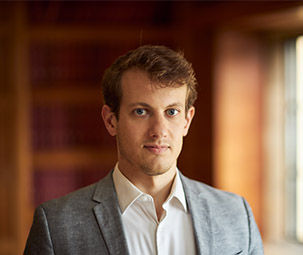
Samuel Bagg is a rising star in political theory. Bagg earned his Ph.D. from Duke University and completed fellowships at McGill University and the University of Oxford prior to joining USC. His groundbreaking work explores the dynamics of social inequality and political power, offering fresh perspectives on democratic governance.
Bagg’s scholarship has appeared in top-tier journals such as American Political Science Review, American Journal of Political Science, Journal of Politics and Journal of Political Philosophy. His first book, The Dispersion of Power: A Critical Realist Theory of Democracy, published by Oxford University Press in 2024, presents a bold new framework for understanding and improving democracy in the face of elite capture and inequality.
Beyond his research, Bagg is a dedicated educator who teaches courses on political theory and actively mentors both undergraduate and graduate students. “Dr. Bagg’s intellectual ambition and ability to translate complex ideas into practical solutions make him an exceptional scholar and teacher,” says Brent Simpson, interim chair of political science.
Jonathan Edwards
Department of English Language and Literature
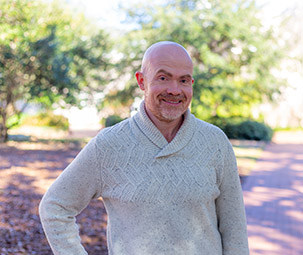
A first-generation college graduate, Jonathan J. Edwards has established himself as a prominent scholar in the study of rhetoric, political communication and religious discourse. His acclaimed book, Superchurch: The Rhetoric and Politics of American Fundamentalism (2015), has become an influential text in understanding the intersection of religion and politics in the U.S. He co-edited Rhetoric of the Protestant Sermon in America (2020), further contributing to the study of religious rhetoric.
Edwards has published extensively in top-tier journals such as Rhetoric Society Quarterly and Communication and Critical/Cultural Studies, and his innovative work spans multiple disciplines. His current research includes a second monograph, God’s Schoolbooks, which investigates the impact of Christian textbooks on American conservatism.
Edwards has taught courses ranging from public speaking to advanced rhetoric theory and consistently receives high praise from students and peers alike for his engaging and thoughtful instruction. English Department Chair Susan Courtney says, “We are lucky to have this outstanding scholar-teacher doing such important research on our faculty and engaging our students so powerfully in the classroom about the critical subjects he teaches.”
Meena Khalili
School of Visual Art and Design
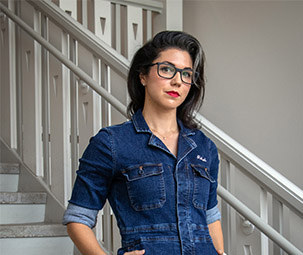
Meena Khalili is an internationally recognized designer and educator recognized for innovation in art and in the classroom. She has received four international design awards as well as the National Award for Outstanding Professional Achievement in Graphic Design from the Southeastern College Art Conference. She was named a Global Top 30 Design Lecturer by The Design Kids in 2023.
Her designs have been featured in exhibitions at galleries across Europe, Asia and North America, and her artwork is in permanent collections around the world, including the Library of Congress.
Khalili's research explores cultural identity and generational storytelling, driven by her experience as an Iranian American. She has led significant grants, including a McCausland Innovation Fund award for integrating artificial intelligence into design education.
"Meena combines pedagogical innovation with creative research excellence,” says Laura Kissel, director of SVAD. “Her work demonstrates the potential to shape not only her field but also the next generation of designers through her committed teaching and mentorship."
Erin Meyer-Gutbrod
School of the Earth, Ocean and Environment
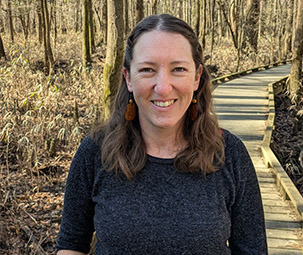
Erin Meyer-Gutbrod leads groundbreaking research in marine ecology and conservation. Her work focuses on the impacts of climate change on marine ecosystems, with particular attention to the critically endangered North Atlantic right whale. Meyer-Gutbrod's research has provided crucial insights to federal agencies like NOAA, helping to guide the management and conservation of endangered whale populations.
Since joining USC in 2020, she has published extensively, and her work has been cited over 800 times. Her work on climate-driven shifts in whale habitats continues to be featured in high-profile media outlets, including The New York Times and NPR.
In addition to her research, Meyer-Gutbrod actively engages in public outreach, education and mentorship. She serves on several committees focused on marine mammal conservation, including the U.S. Marine Mammal Commission’s Committee of Scientific Advisors. “Dr. Meyer-Gutbrod’s record shows that she is passionate about conservation science, education, public outreach and fostering a diverse and inclusive field, and she will continue to share these values with the Gamecock community,” says Gene Yogodzinski, interim director for the SEOE.
Dmitry Peryshkov
Department of Chemistry and Biochemistry

Dmitry Peryshkov is recognized for his contributions to the fields of inorganic and organometallic chemistry. His research in metal-free catalysis is helping to reduce the use of expensive and sometimes toxic metals in the chemical and pharmaceutical industries by finding more sustainable ways to catalyze reactions.
Peryshkov’s research achievements are widely recognized, with over 58 peer-reviewed publications, including several featured in top journals such as Journal of the American Chemical Society and Chemical Science. His work has earned him prestigious accolades, including the NSF CAREER Award and the Doctoral New Investigator Award from the American Chemical Society Petroleum Research Fund. His latest work on boron clusters for metal-free bond activation has advanced the understanding of chemical transformations, addressing key challenges in sustainability.
“Dr. Peryshkov is pushing the boundaries of inorganic chemistry, with discoveries that are poised to transform the field,” says Qian Wang, chair of the Department of Chemistry and Biochemistry.
Changhui Tan
Department of Mathematics

Changhui Tan is recognized for his exceptional research in nonlinear partial differential equations (PDEs) and fluid dynamics. His work addresses complex challenges in physical and biological systems, blending mathematical modeling with innovative analytical and computational methods.
Since joining USC in 2018, he has established himself as a leader in his field, securing over $705,000 in National Science Foundation funding and receiving an NSF CAREER Award in 2023. His papers have appeared in journals such as Annals of PDE and SIAM Journal of Mathematical Analysis. He has given over 100 invited talks, sharing his cutting-edge work with the global scientific community.
Tan teaches a wide range of undergraduate and graduate courses, from calculus to advanced topics in applied mathematics. His teaching evaluations reflect his ability to engage and inspire students, and he mentored two Ph.D. graduates, both securing prestigious postdoctoral positions.
“Dr. Tan is an emerging leader in the department, and his dedication to both research and education makes him an invaluable asset to USC,” says past department chair, Matthew Boylan.
Monica Patrice Barra
Department of Anthropology and School of the Earth, Ocean and Environment
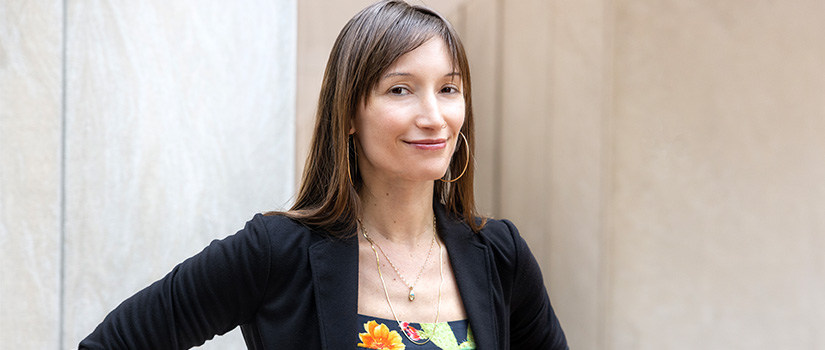
Monica Barra is a cultural anthropologist who is a Latinx, first-generation college graduate. Her ethnographic research focuses on the social, racial, and ecological politics of environmental restoration science and policy in the US South. Her critical work on racial justice and environmental repair has been supported by several national fellowships and grants from across the social sciences and humanities and has led to a number of cross-disciplinary and institutional collaborations.
In recognition of her excellence in research and teaching, in 2023 she won the university's Breakthrough Scholar Award. Department Chair Jennifer Reynolds says Barra is “a model of scholarly excellence, especially for our students of color who see themselves and their interests in our faculty.”
Agnes Bolinska
Department of Philosophy
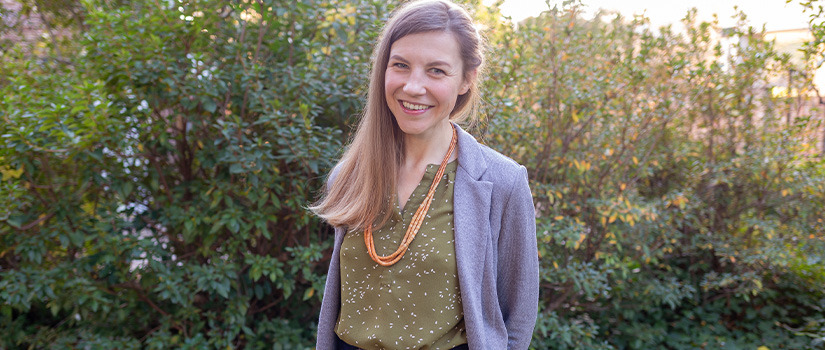
As a philosopher of science, Agnes Bolinska studies how scientists use models to understand biological systems. Her work includes collaborations with philosophers, historians, and scientists, including efforts to determine the structures of large biomolecular complexes by integrating data from multiple sources. Students report that she leads highly engaging classes, and she serves as a mentor through the Philosophy of Science Association’s underrepresented scholars initiative.
“She has already had impressive professional successes, and has made a considerable impact on the department,” says Matt Kisner, department chair. “Her focus on the ways that scientific practice responds to resource limitations is innovative and a fertile field of inquiry, which holds much future promise.”
Meredith DeBoom
Department of Geography
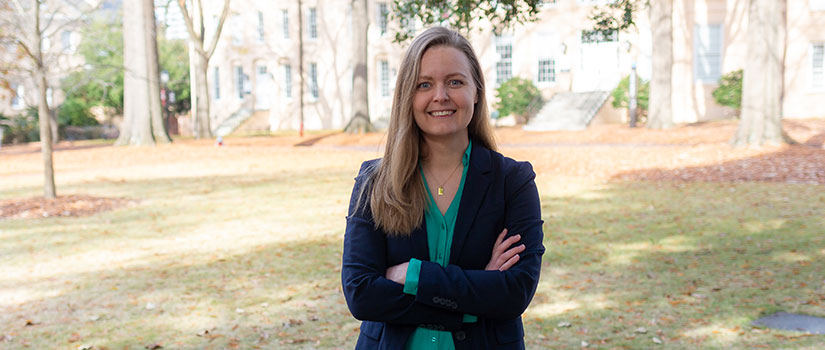
Meredith DeBoom has earned international regard for her research on geopolitics, human rights and the role natural resources play in political processes. She serves as president of the Political Geography Specialty Group of the American Association of Geographers and has published work in the international journal Geopolitics as well as The Washington Post. The BBC World News interviewed her about drought in Africa and international climate change.
DeBoom received a Mungo Undergraduate Teaching Award, and she is a sought-after graduate advisor in environmental and political geography. Jerry Mitchell, department chair, says DeBoom “shows great promise in becoming a leading voice in the field of extractive resource geographies.”
Elizabeth Connors
Department of Political Science
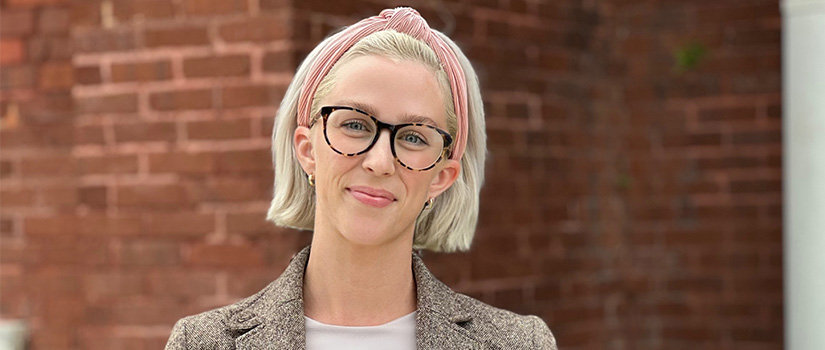
Elizabeth Connors’ research on American Politics has positioned her as a rising star in her field. Her articles have been featured in top-tier journals and won numerous awards. She published a book with Cambridge University press, and her inclusive approach to teaching makes her an excellent mentor to students at all levels.
Notably, one of her graduate classes conducted research that led several students to publish for the first time. Kirk Randazzo, department chair, says, “The process by which Connors produces such high-quality scholarship is impressive. At every stage, she includes students and teaches them about the intricacies of research.”
Noah Gardiner
Department of Religious Studies
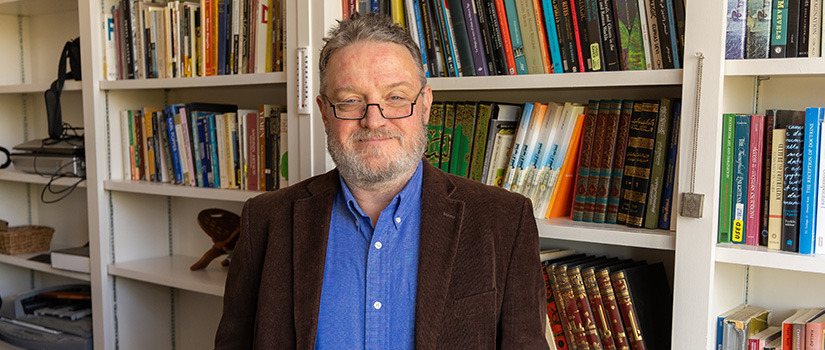
Noah Gardiner’s scholarship in the Islamic occult sciences is interna tionally recognized for innovation. He aims to reshape the scholarly landscape in the areas of Islamic manuscript tradition and the history of science. In addition to publishing widely, Gardiner holds leadership roles in the field and contributes to cultural events in the community.
As an educator, Gardiner receives unanimously positive reviews from students and peers alike. Erin Roberts, department chair, says, “Gardiner establishes a comfortable rapport with students while also challenging them to reconsider their own preconceptions. Teaching in the field of Islam is not an easy task, and yet his teaching is creative and rigorous.”
Dean Hardy
School of the Earth, Ocean & Environment
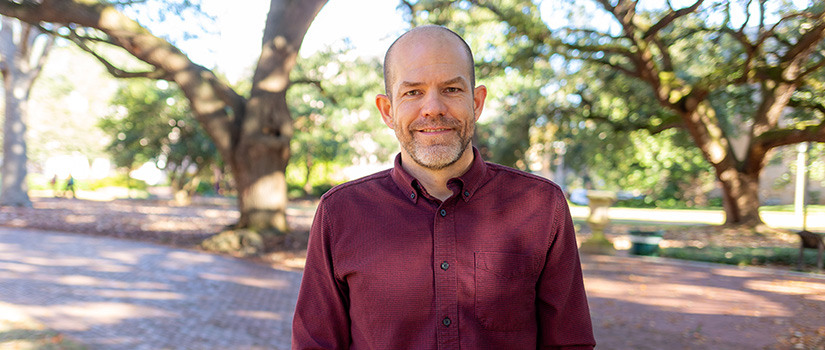
Geographer Dean Hardy’s scholarship breaks new ground in environmental justice by showing how policy and institutions create racial disparities in environmental impacts. His many research collaborations include a major project studying climate change and adaptation in Mississippi, funded by the National Science Foundation.
Hardy also has a stellar teaching record helping students combine technology with more traditional methods for studying environmental challenges. Peter Chametzsky, SEOE interim director, says, “His innovative research and leadership at the intersection of climate change and environmental justice pairs with his intensive course development and great teaching to make him an outstanding candidate for this award.”
Caitlin Hudac
Department of Psychology
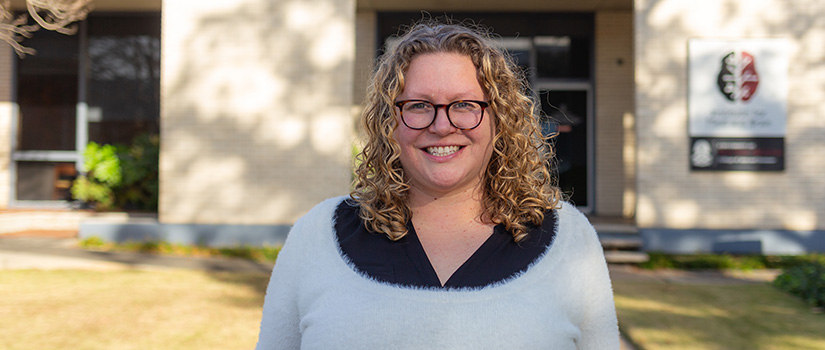
Caitlin Hudac’s research focuses on understanding the developing brain and how brain-body-behavior connections are different in neurodiverse populations, such as autistic individuals. Hudac has obtained significant funding from grants and demonstrated unique initiative by driving across the country to bring brain imaging equipment to the homes of nearly 60 research participants.
Hudac teaches her students the importance of inclusion in sciences, and she has helped the neuroscience field itself increase representation. Amanda Fairchild, associate department chair, says, “One of her papers on conducting EEG research was deemed as a breakthrough for providing necessary methodological procedures that are more inclusive of Black populations.”
Claire Jiménez
Department of English Language and Literature, joint appointment in the Department of African American Studies

Following her first short story collection, Claire Jiménez’s debut novel, What Happened to Ruthy Ramirez, has made her a rising star in the literary scene. The novel has been called one of the best books of 2023 by Time Magazine, Booklist, Library Journal, HipLatina and Today.com, among other publications. Her ongoing scholarship on The Puerto Rican Literature Project has also gained significant funding.
Jiménez’s graduate fiction workshop has been lauded by MFA students, with four novelists now under her mentorship. Susan Courtney, department chair, says, “Our students have exceptional access to, and the invigorating wisdom and mentorship of, this emerging rockstar novelist and scholar.”
Brent Klein
Department of Criminology and Criminal Justice

Brent Klein has set a new pace for scholarship, grant writing and national recognition, both in the department and the field. His research covering topics such as school shooting events and terrorism has received funding from the Department of Homeland Security as well as the National Institute of Justice, positioning him as a trusted voice to inform federal policy related to gun violence, prevention, criminology, and human development.
Department Chair Wendy Regoeczi says, “The extent of his accomplishments at this stage in his career are truly exceptional, and his research areas cover some of the most pressing crime issues currently affecting the country.”
Jie Li
Department of Chemistry and Biochemistry
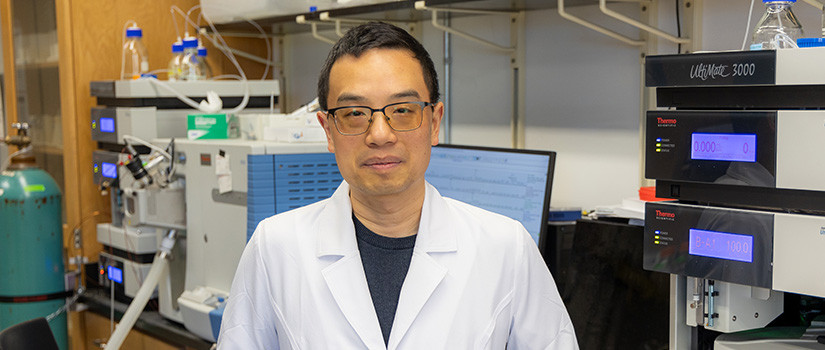
Jie Li’s research in biochemistry and natural product chemistry is recognized nationally for innovation and excellence. With abundant extramural funding and a prolific publication record, Li has increased not only his reputation in the field but also that of the department and USC. His teaching and service record are equally impressive.
Qian Wang, department chair, praised Li's outreach to local elementary, middle, and high schools. Li has also included students from historically Black colleges in workshops and summer research. One of his students writes, “Dr. Li is a phenomenal professor that does a great job of communicating information in an understandable way.”
Ray Bai, Department of Statistics
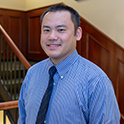
Ray Bai’s expertise in modern data science methods has made him an asset both to the statistics department and the mathematics department. Bai was instrumental in obtaining funding from the National Science Foundation for a collaborative research project. In addition to advising a number of Ph.D. students, he creates outstanding course materials for his classes, with a level of detail beyond compare.
Joshua Tebbs, statistics department chair, says, “Everything Ray does demands excellence—not only of himself but from those around him. All of my colleagues value Ray and the immediate impact he has made here.”
Jessica Bradshaw, Department of Psychology
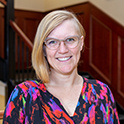
Jessica Bradshaw’s research focuses on early neurobehavioral markers of autism spectrum disorder and developing novel behavioral interventions for infants in the first year of life. Bradshaw directs USC’s Early Social Development Lab and is one of very few clinical scientists who have piloted behavioral interventions for infants as young as six months old.
Internationally known for her work, Bradshaw serves families in the community through free public lectures, workshops and events. Amanda Fairchild, an associate department chair, calls Bradshaw, “a rising star in her field,” and “among the most productive and high-achieving early career scholars” in the department.
Besim Dragovic, School of the Earth, Ocean and Environment
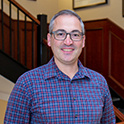
Besim Dragovic’s research on plate tectonics and fluid-rock interactions extends beyond traditional geochronology to uncover new knowledge of Earth’s processes that are more important now than ever before. His focus on geothermal path ways and rates of change is key to understanding Earth’s continued evolution, particularly in the face of climate change.
Dragovic has brought an impressive amount of external funding to the university, while simultaneously exceeding research productivity, publication and impact goals. His students consistently provide excellent feedback on his classroom and mentoring presence. Peter Chametzky, interim director of SEOE, noted that Dragovic’s accomplishments are a “remarkable contribution from an early-career researcher.”
David Fuente, School of the Earth, Ocean and Environment (SEOE)
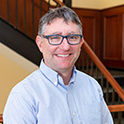
David Fuente’s research brings together sanitation, economics and urban planning. His work on the water infrastructure of sub-Saharan Africa has had global ramifications. His recent work in Alaska included data from nearly inaccessible people groups, which he could obtain only by building long-term trust. His gift for working with people, communities and governments has made him an influential voice in his field.
Peter Chemetsky, Interim Director of the SEOE says: “His work produces practical results that draw serious interest from such organizations as the World Health Organization and the World Bank. This breadth is extraordinary, and he has an extremely bright future.”
Hyunji Kwon, School of Visual Art and Design
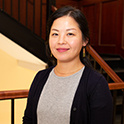
Hyunji Kwon’s work in community-based art education has positively impacted local communities while producing exemplary scholarship. Kwon’s research expertise lies in developing programs that support people who have experienced trauma. Most recently, Kwon and her art education students developed community-based art workshops for adults in underserved communities in Columbia.
As a core faculty member serving the Women’s Well-Being Initiative at USC, Kwon has provided art workshops for women in transitional homes and sexual violence survivors on campus. Such prolific service work is mirrored in her dedication to teaching. Kwon’s students regularly praise her as a “motivating” instructor who consistently creates a “safe space” and inspires their career goals.
Seulghee Lee, Department of English Language and Literature, Joint appointment in the Department of African American Studies
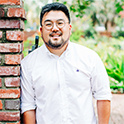
Seulghee Lee’s research brings together Black studies, Asian studies and gender studies. He currently has two book projects in progress and has published numerous articles since he came to USC for a joint tenure-track position in 2017. His teaching has also been exemplary, with often perfect reviews by his classes. As one of his recent students says:
“My most glowing praise for Dr. Lee would not come close to adequately describing the absolute gift this man is to the university and the lives of his students. His wisdom is only outdone by his kindness. His class offered me a world class introduction to these topics.”
Cory Schnell, Department of Criminology and Criminal Justice
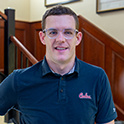
Cory Schnell’s research focuses on improving the policies and practices of police agencies so they may better serve their communities. He has applied his expertise in spatial analysis to topics including police use of force, violent crime hot spots and place-based policing strategies, allowing him to build key partnerships with criminal justice agencies. Schnell has received contracts and grants to support his research and collaborations with local law enforcement agencies, including the Columbia Police Department and Richland County Sheriff’s Department.
“Dr. Schnell is not only a gifted young scholar and committed teacher, he is also a warm, kind, spirited person who brings a great deal of positive energy to our department,” says department chair Wendy C. Regoeczi.
Magdalena E. Stawkowski, Department of Anthropology
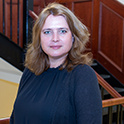
Magdalena Stawkowski specializes in cultural and medical anthropology, focusing on militarized and nuclear spaces and the political economy of health. Her current research examines the socio-cultural legacies of Soviet-era nuclear testing in Kazakhstan and how people navigate everyday life in an environment polluted with residual radioactivity.
Closer to home, Stawkowski is introducing more students to the field of anthropology through her co-created medical anthropology minor program, which is available to all non-major students at USC. Anthropology department chair Jennifer Reynolds notes that Stawkowski continues to generate excitement for anthropology research at USC among undergraduate and graduate students alike.
Jaclyn Wong, Department of Sociology
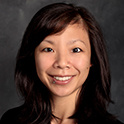
Jaclyn Wong’s research focuses on the intersections of gender, family, work, aging and the life course. Wong has received praise from her colleagues and department leadership for her highly-creative research, as well as going above and beyond in her service work to the university, even beyond her own department. She serves as a faculty affiliate for both the Women’s and Gender Studies Program and Carolina Consortium on Health, Inequalities, and Populations at USC.
Students, both undergraduate and graduate, routinely praise Wong’s commitment in her mentorship capacities. In her research, teaching and mentorship, department chair Brent Simpsons says Wong is “exceptional at every level.”
Annie Bourbonnais, School of the Earth, Ocean and Environment
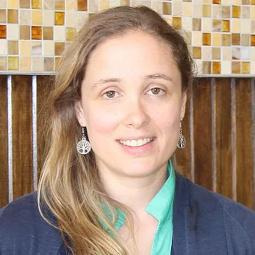 Annie Bourbonnais is an assistant professor at the University of South Carolina, where
she leads the Marine Stable Isotope Biogeochemistry Laboratory in the School of the
Earth, Ocean and Environment. Her research is focused on the biogeochemical processes
that affect climate, particularly the cycling of nitrogen. Since coming to USC in
2018, she has built a state-of-the-art stable isotope research facility and obtained
funding from diverse sources to support her research. Her current research investigates the
sources and sinks of nitrous oxide, a potent greenhouse gas, using concentration and
stable isotopic data from different oceanic environments. She is also involved in
a project using computational methods and autonomous robotics systems for modeling
and predicting harmful cyanobacterial blooms in South Carolina lakes. She has authored
28 peer-reviewed publications in top-tier journals in her field and is passionate
about teaching undergraduate and graduate-level courses to all students.
Annie Bourbonnais is an assistant professor at the University of South Carolina, where
she leads the Marine Stable Isotope Biogeochemistry Laboratory in the School of the
Earth, Ocean and Environment. Her research is focused on the biogeochemical processes
that affect climate, particularly the cycling of nitrogen. Since coming to USC in
2018, she has built a state-of-the-art stable isotope research facility and obtained
funding from diverse sources to support her research. Her current research investigates the
sources and sinks of nitrous oxide, a potent greenhouse gas, using concentration and
stable isotopic data from different oceanic environments. She is also involved in
a project using computational methods and autonomous robotics systems for modeling
and predicting harmful cyanobacterial blooms in South Carolina lakes. She has authored
28 peer-reviewed publications in top-tier journals in her field and is passionate
about teaching undergraduate and graduate-level courses to all students.
Liz Countryman, Department of English Language and Literature
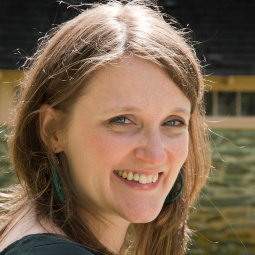 Liz Countryman is an assistant professor in the Department of English Language and
Literature, where she teaches in the MFA Program in Creative Writing. She is the author
of one collection of poems, A Forest Almost. Her poems have appeared in Poetry, American
Poetry Review, Kenyon Review, Denver Quarterly, and elsewhere. She edits the annual
poetry journal Oversound with Samuel Amadon. Countryman’s current project is a collection
of poems entitled Green Island, which delve into the relationship between place and
imagination, examining the ways in which physical places determine the speaker’s understanding
of self. Since coming to USC, she has also served as coordinator for Split P, the
English Department’s outreach initiative, which sends MFA students to local public
schools to lead creative writing workshops. Split P is a unique opportunity for MFA
students to hone their teaching skills while giving local school children the chance
to learn directly from emerging writers in their own city.
Liz Countryman is an assistant professor in the Department of English Language and
Literature, where she teaches in the MFA Program in Creative Writing. She is the author
of one collection of poems, A Forest Almost. Her poems have appeared in Poetry, American
Poetry Review, Kenyon Review, Denver Quarterly, and elsewhere. She edits the annual
poetry journal Oversound with Samuel Amadon. Countryman’s current project is a collection
of poems entitled Green Island, which delve into the relationship between place and
imagination, examining the ways in which physical places determine the speaker’s understanding
of self. Since coming to USC, she has also served as coordinator for Split P, the
English Department’s outreach initiative, which sends MFA students to local public
schools to lead creative writing workshops. Split P is a unique opportunity for MFA
students to hone their teaching skills while giving local school children the chance
to learn directly from emerging writers in their own city.
Jennifer Frey, Department of Philosophy
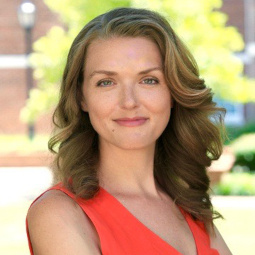 Jennifer A. Frey is an associate professor of philosophy at the University of South
Carolina and a faculty fellow at the Institute for Human Ecology at the Catholic University
of America. She was previously a collegiate assistant professor of humanities at the
University of Chicago, where she was a member of the Society of Fellows in the Liberal
Arts. She earned her doctorate at the University of Pittsburgh and her Bachelor of
Arts at Indiana University in Bloomington. In 2015, she was awarded a multi-million-dollar
grant from the John Templeton Foundation, titled “Virtue, Happiness, and the Meaning
of Life.” She has published widely on virtue, moral psychology, and responsibility,
and she has edited several academic volumes. Her writing has been featured in Breaking
Ground, First Things, Fare Forward, Image, Law and Liberty, The Point, and USA Today.
She is the host of a popular philosophy, literature, and theology podcast, titled
“Sacred and Profane Love.”
Jennifer A. Frey is an associate professor of philosophy at the University of South
Carolina and a faculty fellow at the Institute for Human Ecology at the Catholic University
of America. She was previously a collegiate assistant professor of humanities at the
University of Chicago, where she was a member of the Society of Fellows in the Liberal
Arts. She earned her doctorate at the University of Pittsburgh and her Bachelor of
Arts at Indiana University in Bloomington. In 2015, she was awarded a multi-million-dollar
grant from the John Templeton Foundation, titled “Virtue, Happiness, and the Meaning
of Life.” She has published widely on virtue, moral psychology, and responsibility,
and she has edited several academic volumes. Her writing has been featured in Breaking
Ground, First Things, Fare Forward, Image, Law and Liberty, The Point, and USA Today.
She is the host of a popular philosophy, literature, and theology podcast, titled
“Sacred and Profane Love.”
Rebecca Janzen, Department of Languages, Literatures and Cultures
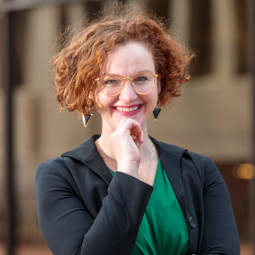 Rebecca Janzen is an associate professor of Spanish and comparative literature at
the University of South Carolina. A scholar of gender, disability, and religious studies
in Mexican literature and culture, Janzen’s research focuses on excluded populations
in Mexico. Her first book, The National Body in Mexican Literature: Collective Challenges
to Biopolitical Control (Palgrave-Macmillan, 2015), explores images of disability
and illness in 20th century texts. Her second book, Liminal Sovereignty: Mennonites
and Mormons in Mexican Culture (SUNY, 2018), focuses on religious minorities. Her
recent book, Unholy Trinity: State, Church and Film in Mexico (SUNY, 2021), deals
with film and religion in Mexico; and her forthcoming book, Unlawful Violence: Law
and Cultural Production in 21st Century Mexico (Vanderbilt, 2022), looks at human
rights, law, and literature. Janzen’s work has garnered the support of the Plett Foundation,
the Kreider Fellowship at Elizabethtown College, and the Newberry library in Chicago,
among others.
Rebecca Janzen is an associate professor of Spanish and comparative literature at
the University of South Carolina. A scholar of gender, disability, and religious studies
in Mexican literature and culture, Janzen’s research focuses on excluded populations
in Mexico. Her first book, The National Body in Mexican Literature: Collective Challenges
to Biopolitical Control (Palgrave-Macmillan, 2015), explores images of disability
and illness in 20th century texts. Her second book, Liminal Sovereignty: Mennonites
and Mormons in Mexican Culture (SUNY, 2018), focuses on religious minorities. Her
recent book, Unholy Trinity: State, Church and Film in Mexico (SUNY, 2021), deals
with film and religion in Mexico; and her forthcoming book, Unlawful Violence: Law
and Cultural Production in 21st Century Mexico (Vanderbilt, 2022), looks at human
rights, law, and literature. Janzen’s work has garnered the support of the Plett Foundation,
the Kreider Fellowship at Elizabethtown College, and the Newberry library in Chicago,
among others.
Samuel McQuillin, Department of Psychology
 Samuel McQuillin is an associate professor of psychology at the University of South
Carolina. McQuillin studies how schools and communities can work together to promote
emotional, behavioral, and academic wellness in children who are environmentally or
developmentally at-risk. His work focuses on translating theories of child development
to pragmatic prevention and intervention strategies. He is particularly interested
in how and why supportive relationships between young people and adult helpers (e.g.
mentors) promote positive youth development. In this work, McQuillin’s aims to improve
the positive influence of these relationships by equipping helpers with skills and
knowledge gleaned from research evidence. As faculty in the School Psychology Ph.D.
program, he helps prepare future scientist-practitioners who want to work with school-aged
children and their caregivers. McQuillin is also affiliated with the department's
quantitative psychology area of emphasis and serves as a quantitative methodologist
on a broad range of research projects.
Samuel McQuillin is an associate professor of psychology at the University of South
Carolina. McQuillin studies how schools and communities can work together to promote
emotional, behavioral, and academic wellness in children who are environmentally or
developmentally at-risk. His work focuses on translating theories of child development
to pragmatic prevention and intervention strategies. He is particularly interested
in how and why supportive relationships between young people and adult helpers (e.g.
mentors) promote positive youth development. In this work, McQuillin’s aims to improve
the positive influence of these relationships by equipping helpers with skills and
knowledge gleaned from research evidence. As faculty in the School Psychology Ph.D.
program, he helps prepare future scientist-practitioners who want to work with school-aged
children and their caregivers. McQuillin is also affiliated with the department's
quantitative psychology area of emphasis and serves as a quantitative methodologist
on a broad range of research projects.
Carolyn Wessinger, Department of Biological Sciences
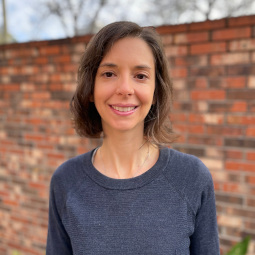 Carolyn Wessinger is an evolutionary biologist with the Department of Biological Sciences
at the University of South Carolina. Her research focuses on determining the genetic
basis of adaptive evolution. Wessinger has worked to develop a new plant model system
(the wildflower genus Penstemon) as a useful model for understanding the genetics
of complex trait evolution. She has used this study system to show that repeated evolution
of the same trait in different lineages involves similar types of genetic changes,
suggesting evolution can involve repeatable genetic mechanisms. Wessinger has published
her work in peer-reviewed journals such as Evolution, The American Naturalist, Evolution
Letters, and Molecular Biology and Evolution, among others, and has received funding
from the National Science Foundation and the National Institutes of Health. An assistant
professor, Wessinger mentors graduate and undergraduate students in independent research
projects and she teaches Ecology and Evolution as well as an advanced seminar on Speciation.
Carolyn Wessinger is an evolutionary biologist with the Department of Biological Sciences
at the University of South Carolina. Her research focuses on determining the genetic
basis of adaptive evolution. Wessinger has worked to develop a new plant model system
(the wildflower genus Penstemon) as a useful model for understanding the genetics
of complex trait evolution. She has used this study system to show that repeated evolution
of the same trait in different lineages involves similar types of genetic changes,
suggesting evolution can involve repeatable genetic mechanisms. Wessinger has published
her work in peer-reviewed journals such as Evolution, The American Naturalist, Evolution
Letters, and Molecular Biology and Evolution, among others, and has received funding
from the National Science Foundation and the National Institutes of Health. An assistant
professor, Wessinger mentors graduate and undergraduate students in independent research
projects and she teaches Ecology and Evolution as well as an advanced seminar on Speciation.
Guillermo Wippold, Department of Psychology
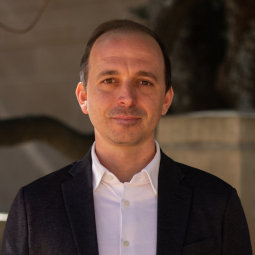 Guillermo M. Wippold is an assistant professor in the Department of Psychology at
the University of South Carolina. His work is anchored in community-based participatory
research and seeks to promote holistic health among underserved communities by leveraging
peer influences. With funding from the National Institutes on Minority Health and
Health Disparities of the National Institutes of Health, Wippold is working to develop,
implement, and evaluate a theoretically based peer-to-peer program to promote health-related
quality of life among African American men in South Carolina. He is also identifying
strategies community health workers can implement to improve preventative healthcare
use by the same community, funded by the Medical University of South Carolina’s Clinical
and Translational Research Institute. In addition, Wippold has made connections with
several statewide organizations that promote health among underserved communities,
such as the South Carolina Community Health Worker Association and the South Carolina
Free Clinic Association, leading to tangible results.
Guillermo M. Wippold is an assistant professor in the Department of Psychology at
the University of South Carolina. His work is anchored in community-based participatory
research and seeks to promote holistic health among underserved communities by leveraging
peer influences. With funding from the National Institutes on Minority Health and
Health Disparities of the National Institutes of Health, Wippold is working to develop,
implement, and evaluate a theoretically based peer-to-peer program to promote health-related
quality of life among African American men in South Carolina. He is also identifying
strategies community health workers can implement to improve preventative healthcare
use by the same community, funded by the Medical University of South Carolina’s Clinical
and Translational Research Institute. In addition, Wippold has made connections with
several statewide organizations that promote health among underserved communities,
such as the South Carolina Community Health Worker Association and the South Carolina
Free Clinic Association, leading to tangible results.
Amanda Dalola, Department of Languages, Literatures and Cultures
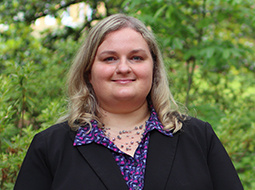 Amanda Dalola earned her doctorate in French linguistics at the University of Texas
at Austin. She also spent two years teaching English at the Université de Strasbourg
in France. At the University of South Carolina, she teaches courses on all aspects
of French linguistics and culture. Dalola’s current research projects include a study
of the sociophonetic conditioning of French final vowel devoicing, a phenomenon in
which vowel sounds are pronounced with a high pitch at the end of a word, and how
this devoicing manifests in digital and spoken French media. She also explores social
media applications in foreign language classrooms, the acquisition of definiteness
among second-language French speakers, and the use of translanguaging, in which speakers
make full use of their skills in multiple languages. Dalola has served her department
in various capacities, and she actively organizes social programming.
Amanda Dalola earned her doctorate in French linguistics at the University of Texas
at Austin. She also spent two years teaching English at the Université de Strasbourg
in France. At the University of South Carolina, she teaches courses on all aspects
of French linguistics and culture. Dalola’s current research projects include a study
of the sociophonetic conditioning of French final vowel devoicing, a phenomenon in
which vowel sounds are pronounced with a high pitch at the end of a word, and how
this devoicing manifests in digital and spoken French media. She also explores social
media applications in foreign language classrooms, the acquisition of definiteness
among second-language French speakers, and the use of translanguaging, in which speakers
make full use of their skills in multiple languages. Dalola has served her department
in various capacities, and she actively organizes social programming.
Sherina Feliciano-Santos, Department of Anthropology
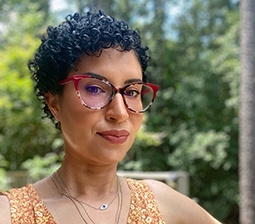 Sherina Feliciano-Santos is a Puerto Rican linguistic and sociocultural anthropologist.
She received her master’s degree and doctorate in anthropology from the University
of Michigan. Her research explores the relationship among language, identity, history,
and social action among differently racialized groups and persons. She focuses on
Indigenous cultural reclamation in Puerto Rico; on traffic stop arrests and policing
in the American South; and on migration, citizenship, race, and ideologies of language
and the nation among Puerto Ricans in Puerto Rico, St. Croix, and the United States.
Her work examines the interactional and positional strategies that social actors use
to negotiate, reinforce or interrupt how they are racialized and ethnically positioned.
She is the author of the book A Contested Caribbean Indigeneity, several peer-reviewed articles, and several shorter pieces that address issues of
contemporary importance, ranging from popular media to Hurricane Maria.
Sherina Feliciano-Santos is a Puerto Rican linguistic and sociocultural anthropologist.
She received her master’s degree and doctorate in anthropology from the University
of Michigan. Her research explores the relationship among language, identity, history,
and social action among differently racialized groups and persons. She focuses on
Indigenous cultural reclamation in Puerto Rico; on traffic stop arrests and policing
in the American South; and on migration, citizenship, race, and ideologies of language
and the nation among Puerto Ricans in Puerto Rico, St. Croix, and the United States.
Her work examines the interactional and positional strategies that social actors use
to negotiate, reinforce or interrupt how they are racialized and ethnically positioned.
She is the author of the book A Contested Caribbean Indigeneity, several peer-reviewed articles, and several shorter pieces that address issues of
contemporary importance, ranging from popular media to Hurricane Maria.
Andrea K. Henderson, Department of Sociology
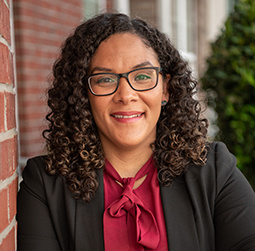 Andrea K. Henderson researches the relationships between religion, race, health, and
family, with a particular interest in how religious activity influences the lives
of Black Americans in the face of social and race-related stressors. She has served
as a principal investigator or co-investigator on several intermural and extramural
grants, including grants from the National Cancer Institute, the Carolina Center on
Alzheimer’s Disease and Minority Research, and ASPIRE-I and -II. She has had peer-reviewed
publications featured in such journals as the Journal of Gerontology: Social Sciences, the Journal for the Scientific Study of Religion, and the Journal of Family Issues. She received her doctorate from the University of Texas at Austin in 2011 and joined
the Department of Sociology at the University of South Carolina in 2013. Henderson
teaches undergraduate and graduate courses on the sociology of religion, sociology
of health, and social problems.
Andrea K. Henderson researches the relationships between religion, race, health, and
family, with a particular interest in how religious activity influences the lives
of Black Americans in the face of social and race-related stressors. She has served
as a principal investigator or co-investigator on several intermural and extramural
grants, including grants from the National Cancer Institute, the Carolina Center on
Alzheimer’s Disease and Minority Research, and ASPIRE-I and -II. She has had peer-reviewed
publications featured in such journals as the Journal of Gerontology: Social Sciences, the Journal for the Scientific Study of Religion, and the Journal of Family Issues. She received her doctorate from the University of Texas at Austin in 2011 and joined
the Department of Sociology at the University of South Carolina in 2013. Henderson
teaches undergraduate and graduate courses on the sociology of religion, sociology
of health, and social problems.
Katherine Ryker, School of the Earth, Ocean and Environment
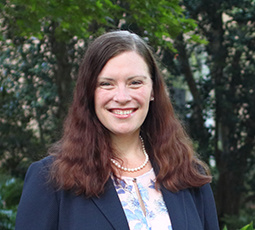 Katherine Ryker is an assistant professor of geoscience education in the School of
the Earth, Ocean, and Environment. She studies how people teach and learn in introductory
college geoscience environments. Her primary research interests revolve around interventions
in introductory geoscience courses, especially labs, to improve cognitive and affective
learning goals and teaching professional development to faculty and graduate teaching
assistants. This includes exploring connections between reformed teaching practices,
student learning, teaching beliefs, and the implementation of inquiry-based geoscience
labs. Her research has been published in the Journal of Geoscience Education, Psychological Science in the Public Interest, the International Journal of STEM Education, and the Journal for STEM Education Research, among others. In 2021, she also received the Biggs Earth Science Teaching Award
and was named a fellow of the Geological Society of America for her “innovative and
effective teaching in college-level Earth science.”
Katherine Ryker is an assistant professor of geoscience education in the School of
the Earth, Ocean, and Environment. She studies how people teach and learn in introductory
college geoscience environments. Her primary research interests revolve around interventions
in introductory geoscience courses, especially labs, to improve cognitive and affective
learning goals and teaching professional development to faculty and graduate teaching
assistants. This includes exploring connections between reformed teaching practices,
student learning, teaching beliefs, and the implementation of inquiry-based geoscience
labs. Her research has been published in the Journal of Geoscience Education, Psychological Science in the Public Interest, the International Journal of STEM Education, and the Journal for STEM Education Research, among others. In 2021, she also received the Biggs Earth Science Teaching Award
and was named a fellow of the Geological Society of America for her “innovative and
effective teaching in college-level Earth science.”
Dexin Shi, Department of Psychology
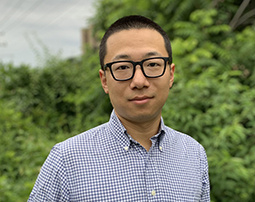 Dexin Shi is an assistant professor of quantitative psychology. His research primarily
focuses on developing, improving, and applying statistical methods for modeling psychological
data. He has authored more than 30 peer-reviewed publications, many of which have
appeared in top-tier journals in his field, including Psychological Methods, Multivariate Behavioral Research, Structural Equation Modeling, and Educational and Psychological Measurement. In 2021, Shi received the Rising Star Award from the Association for Psychological
Science, which “recognizes researchers whose innovative work has already advanced
the field and signals great potential for their continued contributions.” Shi is also
passionate about teaching quantitative methods courses to undergraduate and graduate
students. He received the Innovative Pedagogy Grant from the University of South Carolina’s
Center for Teaching Excellence and the SC Open Educational Resources Faculty Award
from the University Libraries and Student Government.
Dexin Shi is an assistant professor of quantitative psychology. His research primarily
focuses on developing, improving, and applying statistical methods for modeling psychological
data. He has authored more than 30 peer-reviewed publications, many of which have
appeared in top-tier journals in his field, including Psychological Methods, Multivariate Behavioral Research, Structural Equation Modeling, and Educational and Psychological Measurement. In 2021, Shi received the Rising Star Award from the Association for Psychological
Science, which “recognizes researchers whose innovative work has already advanced
the field and signals great potential for their continued contributions.” Shi is also
passionate about teaching quantitative methods courses to undergraduate and graduate
students. He received the Innovative Pedagogy Grant from the University of South Carolina’s
Center for Teaching Excellence and the SC Open Educational Resources Faculty Award
from the University Libraries and Student Government.
Matthew Wilson, Department of Political Science
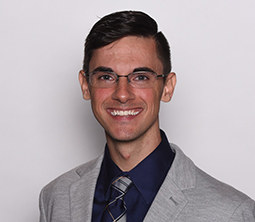 Matthew Wilson holds a doctorate in political science from Pennsylvania State University.
He joined the Department of Political Science at the University of South Carolina
in 2019. He is also a research fellow at the Varieties of Democracy Institute in Gothenburg,
Sweden, where he explores patterns in democratization. Some of his ongoing research
projects focus on the mechanisms that support legislative strengthening and how elections
allow parties in less democratic regimes to establish dominance. He has published
in peer-reviewed journals, including the American Journal of Political Science, the British Journal of Political Science, International Interactions, Political Science Research and Methods, and Comparative Political Studies. He has taught classes such as Dictatorship and Democratization, Latin American Politics,
Advanced Quantitative Methods, and Comparative Politics. He is currently an Innovative
Teaching Associate with the Incubator for Teaching Innovation in the McCausland College
of Arts and Sciences.
Matthew Wilson holds a doctorate in political science from Pennsylvania State University.
He joined the Department of Political Science at the University of South Carolina
in 2019. He is also a research fellow at the Varieties of Democracy Institute in Gothenburg,
Sweden, where he explores patterns in democratization. Some of his ongoing research
projects focus on the mechanisms that support legislative strengthening and how elections
allow parties in less democratic regimes to establish dominance. He has published
in peer-reviewed journals, including the American Journal of Political Science, the British Journal of Political Science, International Interactions, Political Science Research and Methods, and Comparative Political Studies. He has taught classes such as Dictatorship and Democratization, Latin American Politics,
Advanced Quantitative Methods, and Comparative Politics. He is currently an Innovative
Teaching Associate with the Incubator for Teaching Innovation in the McCausland College
of Arts and Sciences.
Samuel Amadon, Department of English Language and Literature
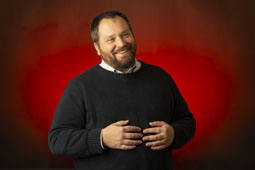 Samuel Amadon is the author of four books of poems and the co-editor of Oversound, an annual poetry journal and chapbook publisher. His first book, Like a Sea (University of Iowa Press, 2010), received the Iowa Poetry Prize and was named the
best debut book of the year by Coldfront. His second book, The Hartford Book (Cleveland State University Poetry Center, 2012), won the Believer Poetry Award and
was listed by the Academy of American Poets as a notable book of 2012. His books also
include Listener (Solid Objects, 2020) and Often, Common, Some, and Free (Omnidawn, 2021). He has published individual poems in many prominent national outlets,
including The New Yorker, The Nation, Poetry, the Kenyon Review, American Poetry Review, and others. At the University of South Carolina, he teaches courses in creative
writing and poetry and directs the MFA program.
Samuel Amadon is the author of four books of poems and the co-editor of Oversound, an annual poetry journal and chapbook publisher. His first book, Like a Sea (University of Iowa Press, 2010), received the Iowa Poetry Prize and was named the
best debut book of the year by Coldfront. His second book, The Hartford Book (Cleveland State University Poetry Center, 2012), won the Believer Poetry Award and
was listed by the Academy of American Poets as a notable book of 2012. His books also
include Listener (Solid Objects, 2020) and Often, Common, Some, and Free (Omnidawn, 2021). He has published individual poems in many prominent national outlets,
including The New Yorker, The Nation, Poetry, the Kenyon Review, American Poetry Review, and others. At the University of South Carolina, he teaches courses in creative
writing and poetry and directs the MFA program.
Tia S. Andersen, Department of Criminology and Criminal Justice
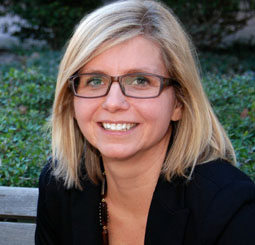 Tia Andersen explores the intersection of service learning, mentoring, and the prevention
of juvenile delinquency. In 2017, she developed the University of South Carolina Adolescent
Mentoring Program, a course that matches trained university students to adolescents
attending a local disciplinary alternative school. Informed by the positive youth
development framework and resiliency theory, students work with mentees on individualized
goal-setting and the development of youth competence, confidence, character, caring,
and connection. Andersen’s current research projects document the impact of the service-learning
experience on University of South Carolina students’ development, learning outcomes,
social outcomes, career development, and relationships, as well as the impact on the
mentees. Dr. Andersen’s work has appeared in Justice Quarterly, Youth Violence and Juvenile Justice, Criminal Justice and Behavior, and Crime & Delinquency.
Tia Andersen explores the intersection of service learning, mentoring, and the prevention
of juvenile delinquency. In 2017, she developed the University of South Carolina Adolescent
Mentoring Program, a course that matches trained university students to adolescents
attending a local disciplinary alternative school. Informed by the positive youth
development framework and resiliency theory, students work with mentees on individualized
goal-setting and the development of youth competence, confidence, character, caring,
and connection. Andersen’s current research projects document the impact of the service-learning
experience on University of South Carolina students’ development, learning outcomes,
social outcomes, career development, and relationships, as well as the impact on the
mentees. Dr. Andersen’s work has appeared in Justice Quarterly, Youth Violence and Juvenile Justice, Criminal Justice and Behavior, and Crime & Delinquency.
Joshua Grace, Department of History
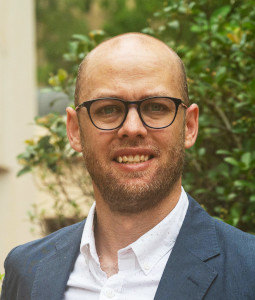 Joshua Grace’s work explores the intersection of technology and development in African
history. It debunks a common stereotype about the continent’s past — that its societies
lack development due to a lack of technology or knowledge — using hundreds of oral
histories in Kiswahili, his apprenticeship in an automobile repair shop in Dar es
Salaam, and archives in East Africa and the United Kingdom. His book, African Motors: Technology, Gender, and the History of Development in Tanzania (Duke University Press, 2021), demonstrates that Africans have shaped car designs
and motor vehicle culture since the early 1900s. His next book-length project, Cars After African Socialism: Sustainability and Skill in Tanzanian Repair Shops, will examine the impact of privatization policies on Tanzanian repair shops since
the late 1970s and will highlight the more sustainable worlds Tanzanian mechanics
created during shortages through reuse and modification.
Joshua Grace’s work explores the intersection of technology and development in African
history. It debunks a common stereotype about the continent’s past — that its societies
lack development due to a lack of technology or knowledge — using hundreds of oral
histories in Kiswahili, his apprenticeship in an automobile repair shop in Dar es
Salaam, and archives in East Africa and the United Kingdom. His book, African Motors: Technology, Gender, and the History of Development in Tanzania (Duke University Press, 2021), demonstrates that Africans have shaped car designs
and motor vehicle culture since the early 1900s. His next book-length project, Cars After African Socialism: Sustainability and Skill in Tanzanian Repair Shops, will examine the impact of privatization policies on Tanzanian repair shops since
the late 1970s and will highlight the more sustainable worlds Tanzanian mechanics
created during shortages through reuse and modification.
Conor Harrison, Department of Geography, School of the Earth, Ocean and Environment
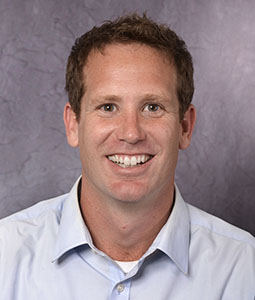 Conor Harrison researches the relationship between energy and society, with a particular
focus on how economic, political, and cultural forces drive energy system transformation.
His current research, which is funded by the National Science Foundation, investigates
how financial actors and institutions are changing the U.S. electricity sector. His
past research traced the flows of investment capital, expertise, and technology in
the ongoing shift to renewable energy in the Caribbean. He also has studied the historical
development of electricity supply systems and markets in the American South. He has
published research in Energy Research and Social Science, the Journal of Latin American Geography, Annals of the Association of American Geographers, and other journals. Harrison’s teaching focuses on energy, the environment, and
sustainability, and he was awarded the 2019 Michael J. Mungo Undergraduate Teaching
Award at the University of South Carolina.
Conor Harrison researches the relationship between energy and society, with a particular
focus on how economic, political, and cultural forces drive energy system transformation.
His current research, which is funded by the National Science Foundation, investigates
how financial actors and institutions are changing the U.S. electricity sector. His
past research traced the flows of investment capital, expertise, and technology in
the ongoing shift to renewable energy in the Caribbean. He also has studied the historical
development of electricity supply systems and markets in the American South. He has
published research in Energy Research and Social Science, the Journal of Latin American Geography, Annals of the Association of American Geographers, and other journals. Harrison’s teaching focuses on energy, the environment, and
sustainability, and he was awarded the 2019 Michael J. Mungo Undergraduate Teaching
Award at the University of South Carolina.
Deena A. Isom, Department of Criminology and Criminal Justice
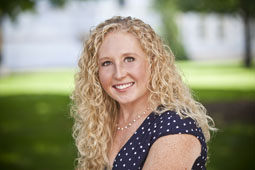 Deena Isom is a critical scholar guided by feminist, Black feminist, and critical
race traditions. Her research broadly focuses on the causes and consequences of inequities
and injustices for marginalized people. In particular, her work has assessed how distinctly
racial and gendered experiences influence people’s likelihood of engaging in criminal
behaviors as well as how internalized beliefs may provide resilience against such
outcomes. Her research has appeared in journals such as the Journal of Criminal Justice, Social Science & Medicine, Youth & Society, the Journal of Contemporary Criminal Justice, and Race and Justice. She teaches courses on criminological theory, race and crime, and critical perspectives
at the graduate and undergraduate levels. Her current research endeavors include a
series of investigations into the associations between whiteness and violent attitudes
and behaviors. Through her research and teaching, she aims to bring marginalized and
oft-forgotten experiences and voices to the forefront to promote equity and inform
socially just change.
Deena Isom is a critical scholar guided by feminist, Black feminist, and critical
race traditions. Her research broadly focuses on the causes and consequences of inequities
and injustices for marginalized people. In particular, her work has assessed how distinctly
racial and gendered experiences influence people’s likelihood of engaging in criminal
behaviors as well as how internalized beliefs may provide resilience against such
outcomes. Her research has appeared in journals such as the Journal of Criminal Justice, Social Science & Medicine, Youth & Society, the Journal of Contemporary Criminal Justice, and Race and Justice. She teaches courses on criminological theory, race and crime, and critical perspectives
at the graduate and undergraduate levels. Her current research endeavors include a
series of investigations into the associations between whiteness and violent attitudes
and behaviors. Through her research and teaching, she aims to bring marginalized and
oft-forgotten experiences and voices to the forefront to promote equity and inform
socially just change.
Zhenlong Li, Department of Geography
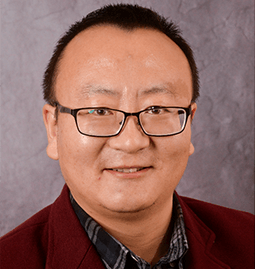 Zhenlong Li researches geospatial big data analytics, high-performance computing,
and spatiotemporal modeling within the area of data- and computational-intensive geographic
information science. In 2015, he established the Geoinformation and Big Data Research
Laboratory, a collaboration with faculty and students conducting research with applications
in disaster management, human mobility, climate analysis, and public health. Dr. Li
has authored more than 70 publications, and he has held multiple leadership positions
in national and international professional associations, most notably as the chair
of the AAG Cyberinfrastructure Specialty Group and the co-chair of ESIP Cloud Computing
Group. He also sits on the editorial board of three international journals. He was
named a Breakthrough Star for research excellence at the University of South Carolina.
His students have won various awards, including the AAG Robert Raskin Student Competition,
the SPARC Graduate Research Grant, the Magellan Scholar Award, the USGIF/NVIDIA GPU
Essay Challenge, and the National Science Foundation travel award.
Zhenlong Li researches geospatial big data analytics, high-performance computing,
and spatiotemporal modeling within the area of data- and computational-intensive geographic
information science. In 2015, he established the Geoinformation and Big Data Research
Laboratory, a collaboration with faculty and students conducting research with applications
in disaster management, human mobility, climate analysis, and public health. Dr. Li
has authored more than 70 publications, and he has held multiple leadership positions
in national and international professional associations, most notably as the chair
of the AAG Cyberinfrastructure Specialty Group and the co-chair of ESIP Cloud Computing
Group. He also sits on the editorial board of three international journals. He was
named a Breakthrough Star for research excellence at the University of South Carolina.
His students have won various awards, including the AAG Robert Raskin Student Competition,
the SPARC Graduate Research Grant, the Magellan Scholar Award, the USGIF/NVIDIA GPU
Essay Challenge, and the National Science Foundation travel award.
Nicole Maskiell, Department of History, African American Studies Program
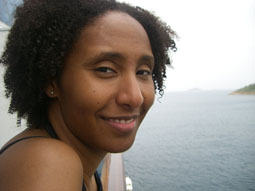 Nicole Maskiell is an active member of the University of South Carolina community,
serving as a faculty associate in the African American Studies Program and the Walker
Institute. In 2019, she was a featured faculty member of the Gamecock Teaching Days.
She has received numerous international fellowships and awards for travel and research.
Her current book project, Bound by Bondage: Slavery and the Creation of a Northern Gentry, examines the dense slaveholding ties that knit together Anglo-Dutch slaveholding
families and spanned the colonial boundaries of the Atlantic, connecting the estates
and manors of the Northeast to the plantations and great houses of the Southern colonies,
the Caribbean, and European metropoles. Cornell University Press will publish her
book in Spring 2022.
Nicole Maskiell is an active member of the University of South Carolina community,
serving as a faculty associate in the African American Studies Program and the Walker
Institute. In 2019, she was a featured faculty member of the Gamecock Teaching Days.
She has received numerous international fellowships and awards for travel and research.
Her current book project, Bound by Bondage: Slavery and the Creation of a Northern Gentry, examines the dense slaveholding ties that knit together Anglo-Dutch slaveholding
families and spanned the colonial boundaries of the Atlantic, connecting the estates
and manors of the Northeast to the plantations and great houses of the Southern colonies,
the Caribbean, and European metropoles. Cornell University Press will publish her
book in Spring 2022.
Hannah Rule, Department of English Language and Literature
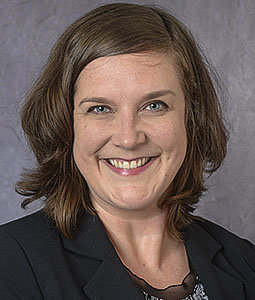 As a scholar and an educator, Hannah J. Rule counters conventional approaches to the
teaching of writing. While traditional process teaching tends to be grounded in abstractions
like drafts and freewriting, Rule demonstrates how attunement to physical bodies,
contexts, and environments increases access, engagement, and efficacy in the teaching
of writing. Her recent book, Situating Writing Processes (WAC Clearinghouse/University Press of Colorado, 2019), makes this case as it reimagines
contemporary process teaching as embodied, situated, and improvisatory. In her undergraduate
and graduate teaching, Rule brings her curious questioning of writing pedagogies to
courses including first-year writing, writing and the body, and the teaching of writing.
Her scholarly attentions now focus on genre pedagogies, and the urgent social need
for critical instruction in information and digital literacies — practices that might
stand a chance against misinformation, conspiracy, and information overload.
As a scholar and an educator, Hannah J. Rule counters conventional approaches to the
teaching of writing. While traditional process teaching tends to be grounded in abstractions
like drafts and freewriting, Rule demonstrates how attunement to physical bodies,
contexts, and environments increases access, engagement, and efficacy in the teaching
of writing. Her recent book, Situating Writing Processes (WAC Clearinghouse/University Press of Colorado, 2019), makes this case as it reimagines
contemporary process teaching as embodied, situated, and improvisatory. In her undergraduate
and graduate teaching, Rule brings her curious questioning of writing pedagogies to
courses including first-year writing, writing and the body, and the teaching of writing.
Her scholarly attentions now focus on genre pedagogies, and the urgent social need
for critical instruction in information and digital literacies — practices that might
stand a chance against misinformation, conspiracy, and information overload.
Michael Gavin, Department of English Language and Literature
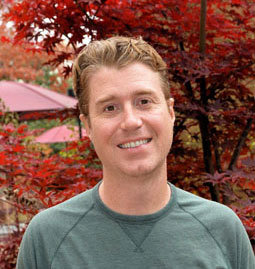 Michael Gavin is author of The Invention of English Criticism, 1650-1760 (Cambridge University Press, 2015) as well as numerous articles. His primary area
of research is the digital humanities, a field of inquiry devoted to understanding
how new computational technologies affect knowledge in traditionally book-based disciplines
such as literature. He regularly teaches courses in the digital humanities, Enlightenment
literature, and British literature, as well as courses in writing and research methods.
His current book project, Language of Place: A Digital History, uses the methods of the digital humanities to study the history of geographical
discourse from the Renaissance to the present.
Michael Gavin is author of The Invention of English Criticism, 1650-1760 (Cambridge University Press, 2015) as well as numerous articles. His primary area
of research is the digital humanities, a field of inquiry devoted to understanding
how new computational technologies affect knowledge in traditionally book-based disciplines
such as literature. He regularly teaches courses in the digital humanities, Enlightenment
literature, and British literature, as well as courses in writing and research methods.
His current book project, Language of Place: A Digital History, uses the methods of the digital humanities to study the history of geographical
discourse from the Renaissance to the present.
Courtney Lewis, Department of Anthropology
 Courtney Lewis is a sociocultural economic anthropologist with research specialties
in American Indian entrepreneurialism and small business ownership, Native Nation
economic sovereignty, and Native Nation economic development. Her broader research
areas of indigenous rights, economic justice, political economy, food sovereignty,
and settler colonialism also span American Indian studies, American studies, and Southern
studies. She earned her doctorate at the University of North Carolina-Chapel Hill's
Department of Anthropology in 2012. This followed two degrees in economics (B.A.,
University of Michigan; M.A., Wayne State University). She is an enrolled citizen
of the Cherokee Nation.
Courtney Lewis is a sociocultural economic anthropologist with research specialties
in American Indian entrepreneurialism and small business ownership, Native Nation
economic sovereignty, and Native Nation economic development. Her broader research
areas of indigenous rights, economic justice, political economy, food sovereignty,
and settler colonialism also span American Indian studies, American studies, and Southern
studies. She earned her doctorate at the University of North Carolina-Chapel Hill's
Department of Anthropology in 2012. This followed two degrees in economics (B.A.,
University of Michigan; M.A., Wayne State University). She is an enrolled citizen
of the Cherokee Nation.
Mercedes Lopez Rodríguez, Department of Languages, Literatures and Cultures
 Originally from Colombia, where she studied anthropology, Dr. Lopez-Rodriguez holds
a doctorate in Spanish literature and cultural studies from Georgetown University.
Her scholarly research lies at the intersection of literary studies, ethnography,
history, and art history, combining textual analysis and anthropological methods and
theory. She is the author of two books: Blancura y otras ficciones raciales en los Andes colombianos del siglo XIX (Whiteness and Other Racial Fictions in the Nineteenth-Century Colombian Andes) (Iberoamericana Veuvert, 2019); and Tiempos para rezar y tiempos para trabajar (ICANH 2001). She is working on a new book, Sensing and Feeling the Other: Hearing, Smelling, Tasting, and Touching Emotions in
Colombia 1850-1970.
Originally from Colombia, where she studied anthropology, Dr. Lopez-Rodriguez holds
a doctorate in Spanish literature and cultural studies from Georgetown University.
Her scholarly research lies at the intersection of literary studies, ethnography,
history, and art history, combining textual analysis and anthropological methods and
theory. She is the author of two books: Blancura y otras ficciones raciales en los Andes colombianos del siglo XIX (Whiteness and Other Racial Fictions in the Nineteenth-Century Colombian Andes) (Iberoamericana Veuvert, 2019); and Tiempos para rezar y tiempos para trabajar (ICANH 2001). She is working on a new book, Sensing and Feeling the Other: Hearing, Smelling, Tasting, and Touching Emotions in
Colombia 1850-1970.
Matthew Melvin-Koushki, Department of History
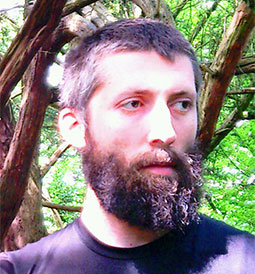 Matthew Melvin-Koushki specializes in early modern Islamicate intellectual and imperial
history, with a focus on the theory and practice of the occult sciences in Iran and
the wider Persianate world from the 14th to the 19th century. He comes to the University
of South Carolina by way of the University of Virginia and Yale University, and he
has held postdoctoral positions at Oxford University and Princeton University. His
three forthcoming books, all based on his award-winning dissertation, pivot on the
theme of science and empire. He is also the co-editor (with Noah Gardiner, also at
the University of South Carolina) of the volume Islamicate Occultism: New Perspectives, the first such in the field to treat post-Mongol Persianate occult developments.
Matthew Melvin-Koushki specializes in early modern Islamicate intellectual and imperial
history, with a focus on the theory and practice of the occult sciences in Iran and
the wider Persianate world from the 14th to the 19th century. He comes to the University
of South Carolina by way of the University of Virginia and Yale University, and he
has held postdoctoral positions at Oxford University and Princeton University. His
three forthcoming books, all based on his award-winning dissertation, pivot on the
theme of science and empire. He is also the co-editor (with Noah Gardiner, also at
the University of South Carolina) of the volume Islamicate Occultism: New Perspectives, the first such in the field to treat post-Mongol Persianate occult developments.
Natalia Shustova, Department of Chemistry and Biochemistry
 Natalia Shustova is the co-author of more than 70 papers and two book chapters, and
she has delivered more than 80 scientific talks. Since 2016, Natalia has also served
as an associate editor of Materials Chemistry Frontiers. In 2019, she was awarded a very prestigious University of South Carolina Distinguished
Undergraduate Research Mentor Award for her involvement in training and mentoring
28 undergraduate students.
Natalia Shustova is the co-author of more than 70 papers and two book chapters, and
she has delivered more than 80 scientific talks. Since 2016, Natalia has also served
as an associate editor of Materials Chemistry Frontiers. In 2019, she was awarded a very prestigious University of South Carolina Distinguished
Undergraduate Research Mentor Award for her involvement in training and mentoring
28 undergraduate students.
Dewei Wang, Department of Statistics
 The primary focus of Deiwei Wang's research is developing new statistical tools for
analyzing pooled testing data, which often arises in biomedical applications. His
current research in this area has resulted in a National Institutes of Health grant.
Dr. Wang's other research interests include quantile regression, order-restricted
inference, and complex data analysis. His work has appeared in peer-reviewed journals
such as Annals of Statistics, Biometrika, Biometrics, Biostatistics, Environmetrics, and Statistics in Medicine. In addition to research, Dr. Wang is also passionate about cultivating his students’
statistical thinking skills. He teaches undergraduate and graduate students about
fundamental theories of statistics in courses such as Probability, Mathematical Statistics,
and Large Sample Theory.
The primary focus of Deiwei Wang's research is developing new statistical tools for
analyzing pooled testing data, which often arises in biomedical applications. His
current research in this area has resulted in a National Institutes of Health grant.
Dr. Wang's other research interests include quantile regression, order-restricted
inference, and complex data analysis. His work has appeared in peer-reviewed journals
such as Annals of Statistics, Biometrika, Biometrics, Biostatistics, Environmetrics, and Statistics in Medicine. In addition to research, Dr. Wang is also passionate about cultivating his students’
statistical thinking skills. He teaches undergraduate and graduate students about
fundamental theories of statistics in courses such as Probability, Mathematical Statistics,
and Large Sample Theory.
Alissa Richmond Armstrong, Department of Biological Sciences
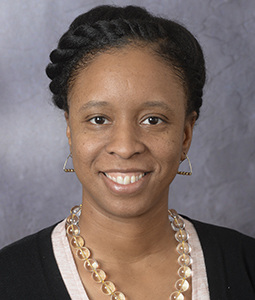 Alissa Richmond Armstrong joined the Department of Biological Sciences in 2016 after
postdoctoral training at the Johns Hopkins Bloomberg School of Public Health. The
Armstrong Lab uses the model organism Drosophila melanogaster — commonly known as the fruit or vinegar fly — to investigate how distinct nutrient
sensing pathways function in fat cells to regulate the well-characterized stem cell-supported
ovary. Given the current obesity epidemic and the link between obesity and increased
risk for several diseases, including type 2 diabetes and cancer, Armstrong hopes that
the research performed in her lab provides a better understanding of the role adipocytes
and adipocyte-dysfunction play in controlling normal and abnormal physiologies.
Alissa Richmond Armstrong joined the Department of Biological Sciences in 2016 after
postdoctoral training at the Johns Hopkins Bloomberg School of Public Health. The
Armstrong Lab uses the model organism Drosophila melanogaster — commonly known as the fruit or vinegar fly — to investigate how distinct nutrient
sensing pathways function in fat cells to regulate the well-characterized stem cell-supported
ovary. Given the current obesity epidemic and the link between obesity and increased
risk for several diseases, including type 2 diabetes and cancer, Armstrong hopes that
the research performed in her lab provides a better understanding of the role adipocytes
and adipocyte-dysfunction play in controlling normal and abnormal physiologies.
In addition to her research, she teaches fundamental genetics and a seminar-style
course on adult stem cells and physiology. As part of her personal and professional
commitment to recruiting and retaining underrepresented groups to the sciences, Armstrong
participates in several outreach activities involving students from elementary to
graduate school.
Lydia Mattice Brandt, School of Visual Art and Design
 An architectural historian and historic preservationist, Lydia Mattice Brandt is known
nationwide for her expertise on George Washington’s Mount Vernon and the remembrance
of America’s early history through material objects and architecture. Her book First in the Homes of His Countrymen: George Washington’s Mount Vernon in the American
Imagination was published by the University of Virginia Press in 2016.
An architectural historian and historic preservationist, Lydia Mattice Brandt is known
nationwide for her expertise on George Washington’s Mount Vernon and the remembrance
of America’s early history through material objects and architecture. Her book First in the Homes of His Countrymen: George Washington’s Mount Vernon in the American
Imagination was published by the University of Virginia Press in 2016.
Fellowships from the Fred W. Smith National Library for the Study of George Washington
at Mount Vernon, the Andrew W. Mellon Foundation, the Crystal Bridges Museum of American
Art, the Winterthur Museum, Garden and Library and the Henry Luce Foundation have
supported her research. Her 2016 monograph received the Henry-Russell Hitchcock Award
from the Victorian Society in America. The University of South Carolina recognized
her outstanding teaching and awarded her the Michael J. Mungo Undergraduate Teaching
Award.
Brandt is also a dedicated advocate for local history and preservation. She has authored
or co-authored National Register of Historic Places nominations in Virginia, South
Carolina and Illinois. She is one of three professors at the University of South Carolina
who led the campaign for a monument to the university’s first African American professor,
Richard T. Greener, erected in early 2018.
Eli Jelly-Schapiro, Department of English Language and Literature
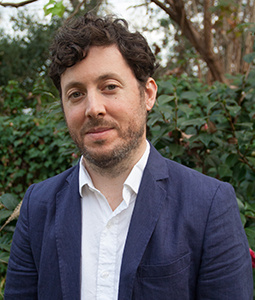 Eli Jelly-Schapiro writes about and teaches contemporary literature within a global
and historical frame. His first book, Security and Terror: American Culture and the Long History of Colonial Modernity, was published by the University of California Press in May 2018. His articles and
essays have appeared in a variety of scholarly and popular venues, including Critique, Mediations, the Journal of American Studies, Transforming Anthropology, the Los Angeles Review of Books, The Millions, The Chronicle Review, Transition, and The Nation.
Eli Jelly-Schapiro writes about and teaches contemporary literature within a global
and historical frame. His first book, Security and Terror: American Culture and the Long History of Colonial Modernity, was published by the University of California Press in May 2018. His articles and
essays have appeared in a variety of scholarly and popular venues, including Critique, Mediations, the Journal of American Studies, Transforming Anthropology, the Los Angeles Review of Books, The Millions, The Chronicle Review, Transition, and The Nation.
He has begun work on a second book project, which explores how the multiple temporalities
of contemporary capitalism are figured in fiction and theory.
Christi Metcalfe, Department of Criminology and Criminal Justice
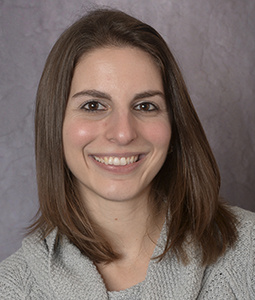 Christi Metcalfe’s research focuses on criminal case processing, developmental patterns
of crime from adolescence to adulthood, and public attitudes toward crime and the
criminal justice system. Specifically, her work has explored the influence of court
room workgroup familiarity and similarity on the plea-bargaining process, the intermittent
nature of offending behavior, and the correlates of support for punitive policy approaches
and policing initiatives. She has also conducted research in Israel regarding ethnic
threats, support for conciliatory solutions, and perceptions of the police.
Christi Metcalfe’s research focuses on criminal case processing, developmental patterns
of crime from adolescence to adulthood, and public attitudes toward crime and the
criminal justice system. Specifically, her work has explored the influence of court
room workgroup familiarity and similarity on the plea-bargaining process, the intermittent
nature of offending behavior, and the correlates of support for punitive policy approaches
and policing initiatives. She has also conducted research in Israel regarding ethnic
threats, support for conciliatory solutions, and perceptions of the police.
Her work has appeared in journals such as Justice Quarterly, Law & Society Review, the Journal of Research in Crime and Delinquency, the Journal of Quantitative Criminology, and Criminal Justice and Behavior. She co-authored an anthology titled Criminal Courts in Theory, Research, & Practice: A Reader. Metcalfe enjoys working with undergraduate and graduate students on research projects
and teaches courses on criminal courts, crime over the life course, and criminological
theory.
Steven Rodney, Department of Physics and Astronomy
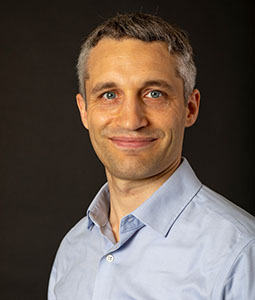 Stevem Rodney’s research centers on the use of gravitational lensing to study distant
stars that are magnified by the curvature of space. He was part of an international
team of astronomers who used this technique with the Hubble Space Telescope to study
the most distant star ever seen. Rodney is now part of a NASA-funded project aiming
to locate stellar explosions so far away that their light has taken 10 to 13 billion
years to reach Earth. He is working with University of South Carolina undergraduates
and doctoral students to build software and design survey strategies for the James
Webb Space Telescope, which launches in 2020, and the Wide Field Infrared Survey Telescope,
scheduled for the mid-2020s.
Stevem Rodney’s research centers on the use of gravitational lensing to study distant
stars that are magnified by the curvature of space. He was part of an international
team of astronomers who used this technique with the Hubble Space Telescope to study
the most distant star ever seen. Rodney is now part of a NASA-funded project aiming
to locate stellar explosions so far away that their light has taken 10 to 13 billion
years to reach Earth. He is working with University of South Carolina undergraduates
and doctoral students to build software and design survey strategies for the James
Webb Space Telescope, which launches in 2020, and the Wide Field Infrared Survey Telescope,
scheduled for the mid-2020s.
In 2018, Rodney was recognized with the university’s Garnet Apple Award for teaching
excellence. Rodney earned a bachelor's degree in physics and astronomy at Case Western
Reserve University in Cleveland, Ohio, and went on to graduate studies at the Institute
for Astronomy of the University of Hawaii. After completing his dissertation on stellar
explosions, he became a postdoctoral researcher at Johns Hopkins University in Baltimore,
Maryland, where he was awarded a Hubble Postdoctoral Research Fellowship.
Sean Yee, Department of Mathematics
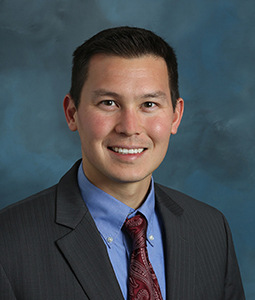 Sean Yee’s scholarship synergizes the teaching and learning of undergraduate mathematics.
His primary focus is providing seminars and courses on teaching for mathematics graduate
students who are teaching assistants or full instructors of record for undergraduate
mathematics courses. His research has resulted in multiple National Science Foundation
grants revolving around peer mentorship models for graduate student instructors.
Sean Yee’s scholarship synergizes the teaching and learning of undergraduate mathematics.
His primary focus is providing seminars and courses on teaching for mathematics graduate
students who are teaching assistants or full instructors of record for undergraduate
mathematics courses. His research has resulted in multiple National Science Foundation
grants revolving around peer mentorship models for graduate student instructors.
With these grants, Yee has created and implemented professional development for experienced
graduate students to mentor novice graduate students in teaching, generating a community
of practice around teaching. Prior to coming to the University of South Carolina,
Yee taught secondary mathematics for six years in Ohio and was an assistant professor
of mathematics education at California State University, Fullerton. His scholarship
has also included book chapters and journal publications focusing on mathematical
proof education, educational discourse theory, conceptual metaphor theory as a means
to improve teacher listening, secondary methods courses, and mathematical problem-solving.
Lori Ziolkowski, School of the Earth, Ocean and Environment
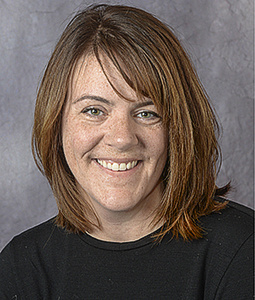 Lori Ziolkowski leads a dynamic lab of graduate and undergraduate students on research
topics related to climate change in the polar regions and life in extreme environments.
Her efforts have included field work in Antarctica and several Arctic locations.
Ziolkowski is passionate about broadly sharing her knowledge of climate change and
teaches science majors and non-major classes alike.
Lori Ziolkowski leads a dynamic lab of graduate and undergraduate students on research
topics related to climate change in the polar regions and life in extreme environments.
Her efforts have included field work in Antarctica and several Arctic locations.
Ziolkowski is passionate about broadly sharing her knowledge of climate change and
teaches science majors and non-major classes alike.
Her research has garnered international recognition. She was named the Baillet Latour
Fellow, a Belgian initiative that provides young scientists with opportunities to
conduct research in east Antarctica. She also was named a University of South Carolina
Breakthrough Rising Star.
Ziolkowski completed postdoctoral research at McMaster University in Hamilton, Ontario,
Canada, where she was a National Science and Engineering Research Council postdoctoral
fellow.
Jennifer Augustine, Department of Sociology
 Jennifer Augustine joined the Department of Sociology in 2015 and has taught courses
on the sociology of education and inequality among others. She earned her doctorate
in sociology from the University of Texas at Austin and was a postdoctoral fellow
at Rice University. Augustine's research aims to understand the complex forces that
contribute to the reproduction of inequality across generations in modern American
society. She is particularly interested in the role that the historic increases in
American women's educational attainment has played in this process. She has had peer-reviewed
publications featured in such journals as Social Science Quarterly, Population Research and Policy Review, and the Journal of Marriage and Family.
Jennifer Augustine joined the Department of Sociology in 2015 and has taught courses
on the sociology of education and inequality among others. She earned her doctorate
in sociology from the University of Texas at Austin and was a postdoctoral fellow
at Rice University. Augustine's research aims to understand the complex forces that
contribute to the reproduction of inequality across generations in modern American
society. She is particularly interested in the role that the historic increases in
American women's educational attainment has played in this process. She has had peer-reviewed
publications featured in such journals as Social Science Quarterly, Population Research and Policy Review, and the Journal of Marriage and Family.
Jessica Barnes, School of the Earth, Ocean and Environment, Department of Geography
 Jessica Barnes' work focuses on the culture and politics of resource use and environmental
change in the Middle East. Barnes’ first book, Cultivating the Nile: The Everyday Politics of Water in Egypt (Duke University Press, 2014), received the 2016 James M. Blaut Award from the Cultural
and Political Ecology Specialty Group of the American Association of Geographers.
Other publications include Climate Cultures: Anthropological Perspectives on Climate Change (Yale University Press, 2015), which was co-edited with Michael Dove; and articles
in several academic journals, including Environment and Planning D, Geoforum, the Journal of the Royal Anthropological Institute, Social Studies of Science, Nature Climate Change, and Critique of Anthropology. In 2013, she was awarded the Junior Scholar Award of the Anthropology and Environment
Society of the American Anthropological Association. Barnes’ current project, which
has been funded by fellowships from the American Council of Learned Societies and
the George A. and Eliza Gardner Howard Foundation, draws on ethnographic and archival
work to examine food security in Egypt and the longstanding identification of security
with self-sufficiency in wheat and bread.
Jessica Barnes' work focuses on the culture and politics of resource use and environmental
change in the Middle East. Barnes’ first book, Cultivating the Nile: The Everyday Politics of Water in Egypt (Duke University Press, 2014), received the 2016 James M. Blaut Award from the Cultural
and Political Ecology Specialty Group of the American Association of Geographers.
Other publications include Climate Cultures: Anthropological Perspectives on Climate Change (Yale University Press, 2015), which was co-edited with Michael Dove; and articles
in several academic journals, including Environment and Planning D, Geoforum, the Journal of the Royal Anthropological Institute, Social Studies of Science, Nature Climate Change, and Critique of Anthropology. In 2013, she was awarded the Junior Scholar Award of the Anthropology and Environment
Society of the American Anthropological Association. Barnes’ current project, which
has been funded by fellowships from the American Council of Learned Societies and
the George A. and Eliza Gardner Howard Foundation, draws on ethnographic and archival
work to examine food security in Egypt and the longstanding identification of security
with self-sufficiency in wheat and bread.
Barnes also teaches courses on the environment, water resources management, food politics,
and international development.
Ryan Rykaczewski, School of the Earth Ocean and Environment
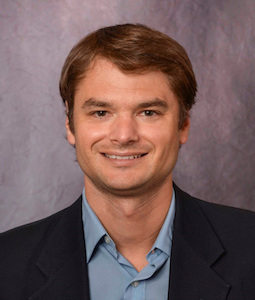 A former postdoctoral scholar at the NOAA Geophysical Fluid Dynamics Laboratory and
Princeton University, Ryan Rykaczewski is now a biological oceanographer at the University
of South Carolina, with research focusing on the sensitivity of marine biogeochemical
cycles, ecosystem structure, and fisheries production to changing ocean climate and
physics. The motivation behind this work is a desire to better understand the mechanisms
through which climate change influences the dynamics of marine ecosystems. Such knowledge
would permit better management, conservation, and exploitation of the ocean’s fish
populations. Rykaczewski is active in international oceanographic organizations, most
prominently the North Pacific Marine Science Organization. He teaches graduate and
undergraduate students about the connections between marine ecosystems and human activity
in courses such as Ocean and Society and Marine Fisheries Ecology.
A former postdoctoral scholar at the NOAA Geophysical Fluid Dynamics Laboratory and
Princeton University, Ryan Rykaczewski is now a biological oceanographer at the University
of South Carolina, with research focusing on the sensitivity of marine biogeochemical
cycles, ecosystem structure, and fisheries production to changing ocean climate and
physics. The motivation behind this work is a desire to better understand the mechanisms
through which climate change influences the dynamics of marine ecosystems. Such knowledge
would permit better management, conservation, and exploitation of the ocean’s fish
populations. Rykaczewski is active in international oceanographic organizations, most
prominently the North Pacific Marine Science Organization. He teaches graduate and
undergraduate students about the connections between marine ecosystems and human activity
in courses such as Ocean and Society and Marine Fisheries Ecology.
Michael Gibbs Hill, Department of Languages, Literature and Cultures
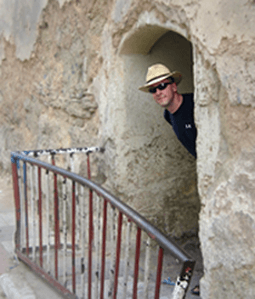 Before becoming a McCausland Fellow, Professor Hill published his first book, Lin Shu Ink: Translation and the Making of Modern Chinese Culture (Oxford University Press, 2013), and regularly contributed as a Chinese translator.
He recently returned to the classroom to study modern standard Arabic so that he could
begin his next project, working on the history of cultural relations between China
and the Middle East. In April 2016, he conducted a one-day workshop on the topic for
the Center for Asian Studies in the Walker Institute.
Before becoming a McCausland Fellow, Professor Hill published his first book, Lin Shu Ink: Translation and the Making of Modern Chinese Culture (Oxford University Press, 2013), and regularly contributed as a Chinese translator.
He recently returned to the classroom to study modern standard Arabic so that he could
begin his next project, working on the history of cultural relations between China
and the Middle East. In April 2016, he conducted a one-day workshop on the topic for
the Center for Asian Studies in the Walker Institute.
Gretchen J . Woertendyke, Department of English Language and Literature
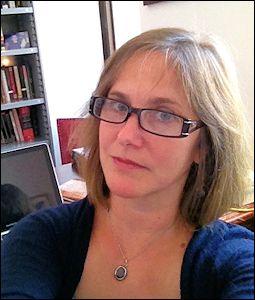 Gretchen Woertendyke published her book, Hemispheric Regionalism: Romance and the Geography of Genre (Oxford University Press, 2016), as a McCausland Fellow. The book constructs a new
literary genealogy by bringing together popular culture, fugitive slave narratives,
advertisements, political treaties, and fiction that centers on Haiti and Cuba. Woertendyke
has begun writing and researching her next book, A History of Secrecy in the New World, which explores how Jacobin terror, slave conspiracy, and Freemasonry are perceived
as threatening. Her exploration of cultural dynamics in literature expands into the
classroom, where she teaches Piracy and the Atlantic World and an African American
Literature course that draws on modern racial conflicts. In the English department,
she started the undergraduate literary society INK!
Gretchen Woertendyke published her book, Hemispheric Regionalism: Romance and the Geography of Genre (Oxford University Press, 2016), as a McCausland Fellow. The book constructs a new
literary genealogy by bringing together popular culture, fugitive slave narratives,
advertisements, political treaties, and fiction that centers on Haiti and Cuba. Woertendyke
has begun writing and researching her next book, A History of Secrecy in the New World, which explores how Jacobin terror, slave conspiracy, and Freemasonry are perceived
as threatening. Her exploration of cultural dynamics in literature expands into the
classroom, where she teaches Piracy and the Atlantic World and an African American
Literature course that draws on modern racial conflicts. In the English department,
she started the undergraduate literary society INK!
Sharon DeWitte, Department of Anthropology, Department of Biological Sciences
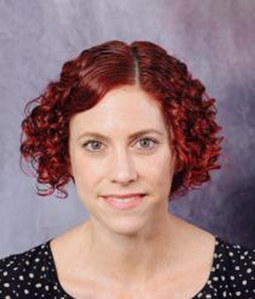 Sharon DeWitte used her fellowship to publish research on the health and demographic
consequences of the Black Death and the context of the emergence of this first outbreak
of medieval plague. This research takes on an interdisciplinary nature. She has begun
new research to examine the associations between diet, migration, death, and mortality
in the medieval and early modern period in London. For the Department of Biological
Sciences, DeWitte has planned online courses for Human Anatomy and Physiology I and
II. She also mentored graduate students as they applied for National Science Foundation
dissertation grants.
Sharon DeWitte used her fellowship to publish research on the health and demographic
consequences of the Black Death and the context of the emergence of this first outbreak
of medieval plague. This research takes on an interdisciplinary nature. She has begun
new research to examine the associations between diet, migration, death, and mortality
in the medieval and early modern period in London. For the Department of Biological
Sciences, DeWitte has planned online courses for Human Anatomy and Physiology I and
II. She also mentored graduate students as they applied for National Science Foundation
dissertation grants.
Sarah Schneckloth, School of Visual Art and Design
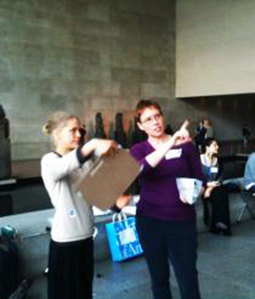 Sara Schneckloth is based in the School of Visual Art and Design, but through the
McCausland Fellowship, she made research connections throughout the McCausland College
of Arts and Sciences. Her research centers on the intersection of biology, geology,
and architecture as understood through the practice of drawing. She has mounted nine
exhibitions, including solo exhibitions in New York and Chicago. Schenckloth is equally
dedicated to her students, spending her time advising and mentoring students on top
of studio class time. She also teaches a three-week summer drawing intensive.
Sara Schneckloth is based in the School of Visual Art and Design, but through the
McCausland Fellowship, she made research connections throughout the McCausland College
of Arts and Sciences. Her research centers on the intersection of biology, geology,
and architecture as understood through the practice of drawing. She has mounted nine
exhibitions, including solo exhibitions in New York and Chicago. Schenckloth is equally
dedicated to her students, spending her time advising and mentoring students on top
of studio class time. She also teaches a three-week summer drawing intensive.
Federica Clementi Schoeman, Department of English, Jewish Studies Program
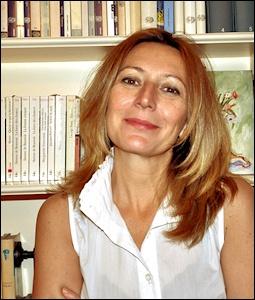 During her time as a McCausland Fellow, Federica Clementi Schoeman completed two manuscripts:
Out of America, a memoir of her own experiences as an immigrant to the United States; and Holocaust Mothers and Daughters (UPNE, 2013), a study of Holocaust memoirs, autobiographies, and dairies by Jewish
women. Her coursework and research are tied through her personal experience and the
courses she develops. For the Women and Gender Studies Program and the department
of English, Clementi teaches a course on women writers. She has also completed a screenplay,
Pour la vie – For Life. It is based on the life of a Holocaust survivor. Because of the in-depth research
and writing that Clementi has done through the McCausland Fellowship, she has been
able to speak at numerous conferences and publish many articles.
During her time as a McCausland Fellow, Federica Clementi Schoeman completed two manuscripts:
Out of America, a memoir of her own experiences as an immigrant to the United States; and Holocaust Mothers and Daughters (UPNE, 2013), a study of Holocaust memoirs, autobiographies, and dairies by Jewish
women. Her coursework and research are tied through her personal experience and the
courses she develops. For the Women and Gender Studies Program and the department
of English, Clementi teaches a course on women writers. She has also completed a screenplay,
Pour la vie – For Life. It is based on the life of a Holocaust survivor. Because of the in-depth research
and writing that Clementi has done through the McCausland Fellowship, she has been
able to speak at numerous conferences and publish many articles.
Adam M. Schor, Department of History
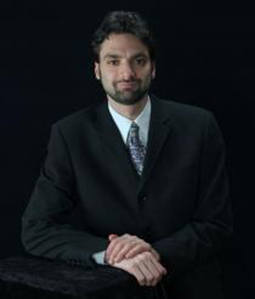 Before becoming a McCausland Fellow, Professor Schor published his first book, Theordoret’s People (University of California Press, 2011). With the McCausland Fellowship, Schor has
been able to research his second historical monograph: a broad study of the ways in
which the early Christian clergy organized itself in the second to fifth centuries
under the leadership of bishops and claimed influence over the hitherto diffuse Christian
community. In the classroom, he has developed a half-online, half-flipped classroom
format for the European Civilization course. On campus, Schor formed the Jewish Faculty
and Staff Council, which is now part of the Provost’s Diversity and Inclusion Advisory
Committee, to increase support for Jewish students at Carolina.
Before becoming a McCausland Fellow, Professor Schor published his first book, Theordoret’s People (University of California Press, 2011). With the McCausland Fellowship, Schor has
been able to research his second historical monograph: a broad study of the ways in
which the early Christian clergy organized itself in the second to fifth centuries
under the leadership of bishops and claimed influence over the hitherto diffuse Christian
community. In the classroom, he has developed a half-online, half-flipped classroom
format for the European Civilization course. On campus, Schor formed the Jewish Faculty
and Staff Council, which is now part of the Provost’s Diversity and Inclusion Advisory
Committee, to increase support for Jewish students at Carolina.
Blaine Griffen, School of the Earth, Ocean and Environment, Department of Biological Sciences
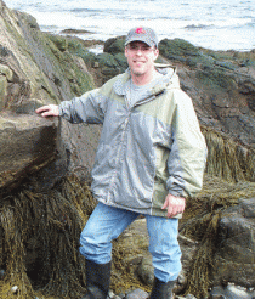 Blaine Griffen’s National Science Foundation-supported research explores human effects
on marine life and variation between individuals within populations. He developed
the Marine Conservation Biology course and has been active in mentoring students and
encouraging student research. Griffen has mentored five doctoral students and two
graduate students, and 22 undergraduate students have conducted research in his lab.
Griffen has also contributed to the larger academic community by providing over 100
education outreach presentations to K-12 classes in South Carolina and serving as
the associate editor for the Journal of Animal Ecology since 2014.
Blaine Griffen’s National Science Foundation-supported research explores human effects
on marine life and variation between individuals within populations. He developed
the Marine Conservation Biology course and has been active in mentoring students and
encouraging student research. Griffen has mentored five doctoral students and two
graduate students, and 22 undergraduate students have conducted research in his lab.
Griffen has also contributed to the larger academic community by providing over 100
education outreach presentations to K-12 classes in South Carolina and serving as
the associate editor for the Journal of Animal Ecology since 2014.
Hunter H. Gardner, Department of Languages, Literature and Cultures
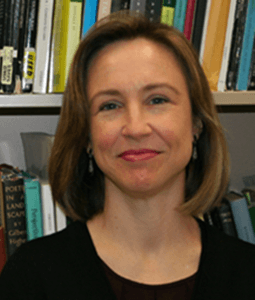 Hunter Gardner has been able to expand her research because of the McCausland Fellowship.
She increased her study of plague narratives and of Greco-Roman antiquity in film
and popular culture. She also co-authored Odyssean Identities in Modern Cultures (Ohio State University Press, 2014), an edited volume on the reception of the Odysseus
myth in the 20th century. She brought the themes from her research into the classroom
and developed a new course on plague narratives that allowed students to explore everything
from Boccaccio’s Decameron to the modern-day AMC show The Walking Dead. Gardner has mentored McNair Scholars and Magellan Scholars and organized the Classics
Day outreach program at the University of South Carolina.
Hunter Gardner has been able to expand her research because of the McCausland Fellowship.
She increased her study of plague narratives and of Greco-Roman antiquity in film
and popular culture. She also co-authored Odyssean Identities in Modern Cultures (Ohio State University Press, 2014), an edited volume on the reception of the Odysseus
myth in the 20th century. She brought the themes from her research into the classroom
and developed a new course on plague narratives that allowed students to explore everything
from Boccaccio’s Decameron to the modern-day AMC show The Walking Dead. Gardner has mentored McNair Scholars and Magellan Scholars and organized the Classics
Day outreach program at the University of South Carolina.
Catherine Keyser, Department of English Language and Literature
 Catherine Keyser used her time as a McCausland Fellow to explore food studies and
race, which inspired her current book project. The increase in her research has drawn
the attention of scholars in her field, and Keyser has been invited to present her
research at several major conferences. In the classroom, Keyser furthered her study
of American literature by developing courses such as the graduate seminar Vehicles
of Modernity, which focuses on transportation technology in modern American literature.
She has directed four doctoral dissertations and served on several master of fine
arts thesis committees.
Catherine Keyser used her time as a McCausland Fellow to explore food studies and
race, which inspired her current book project. The increase in her research has drawn
the attention of scholars in her field, and Keyser has been invited to present her
research at several major conferences. In the classroom, Keyser furthered her study
of American literature by developing courses such as the graduate seminar Vehicles
of Modernity, which focuses on transportation technology in modern American literature.
She has directed four doctoral dissertations and served on several master of fine
arts thesis committees.
Joseph A. November, Department of History
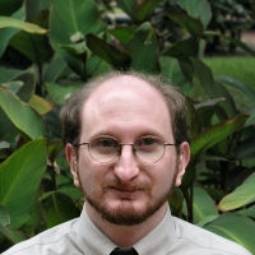 Joseph November’s research takes place at the nexus of technology and history. The
McCausland Fellowship has allowed him to begin research for two books: first, a story
of volunteers who used their computers to transform the relationship between science
and the public; and second, a biography of Robert Ledley, inventor of the whole-body
CT scanner. He has presented this research at invited talks. In the classroom, November
has developed a Video Games and History course that garnered national attention.
Joseph November’s research takes place at the nexus of technology and history. The
McCausland Fellowship has allowed him to begin research for two books: first, a story
of volunteers who used their computers to transform the relationship between science
and the public; and second, a biography of Robert Ledley, inventor of the whole-body
CT scanner. He has presented this research at invited talks. In the classroom, November
has developed a Video Games and History course that garnered national attention.